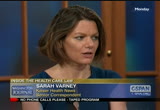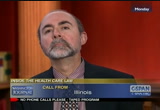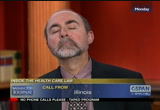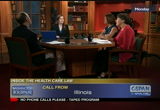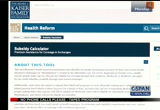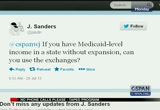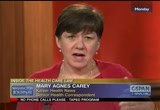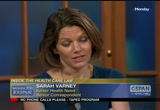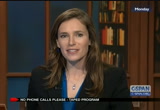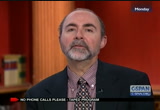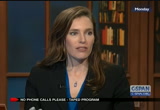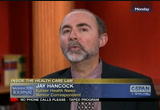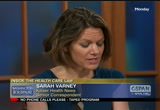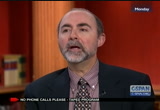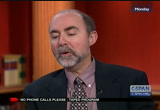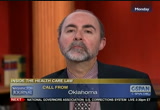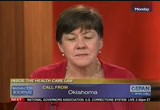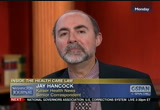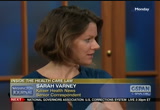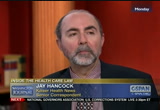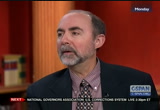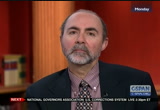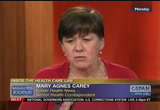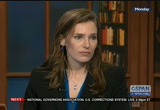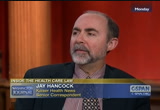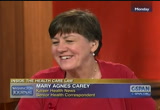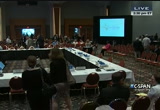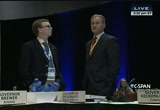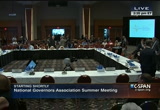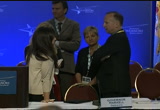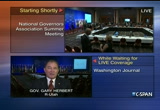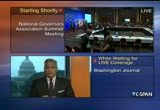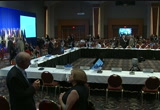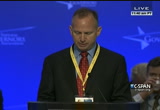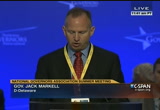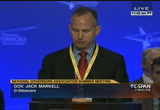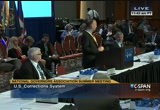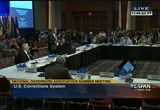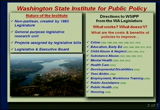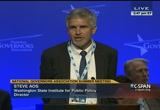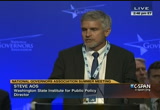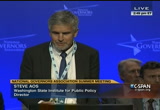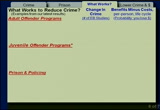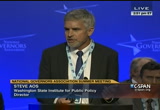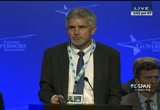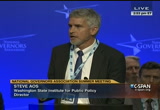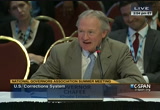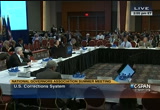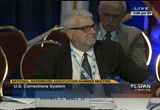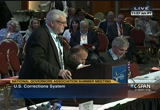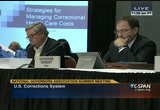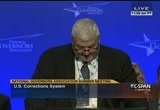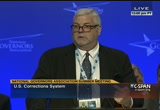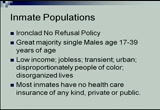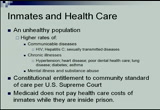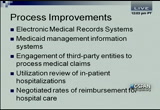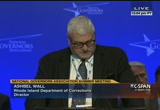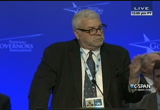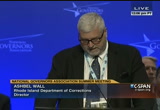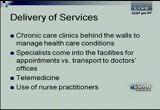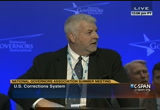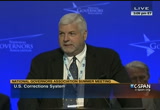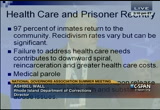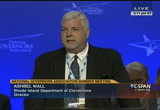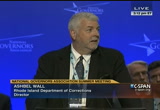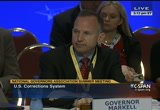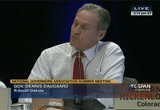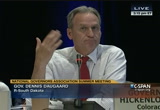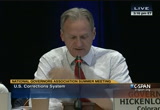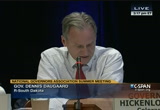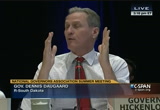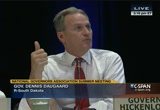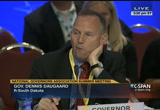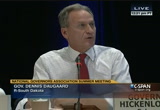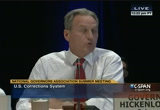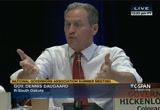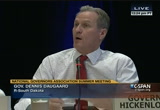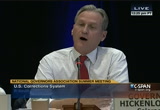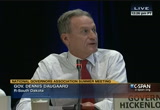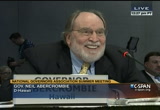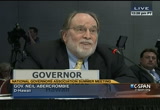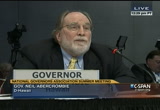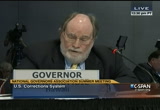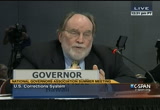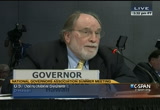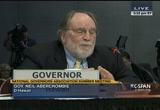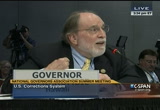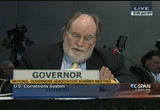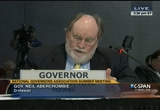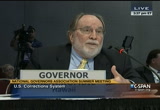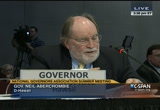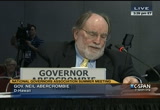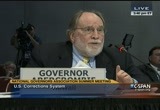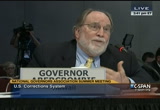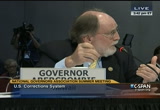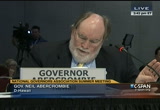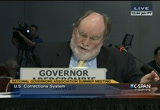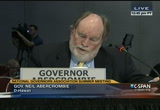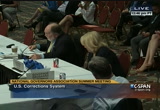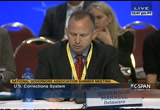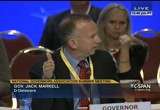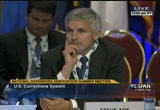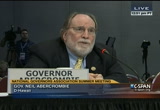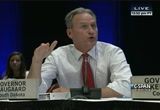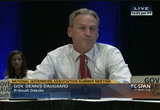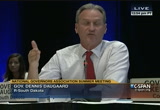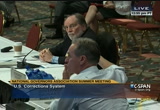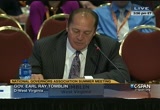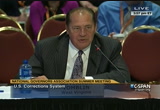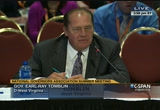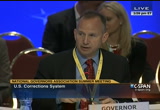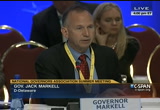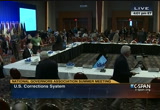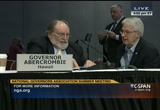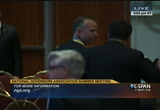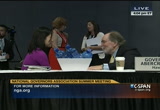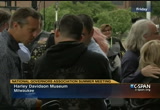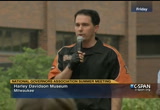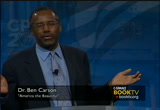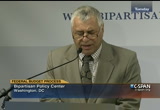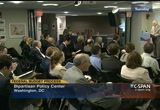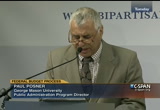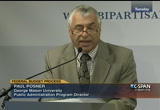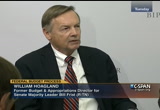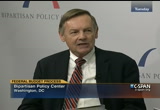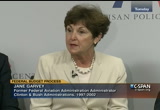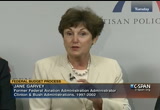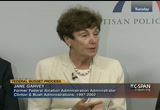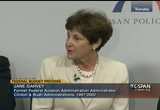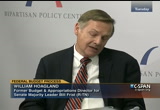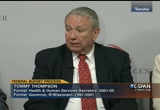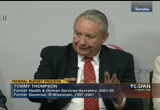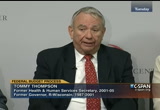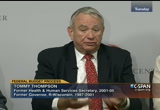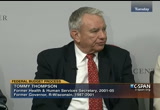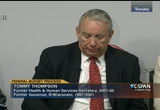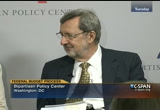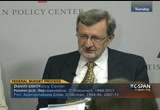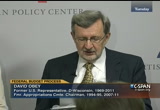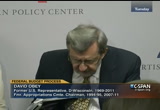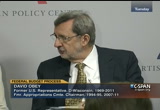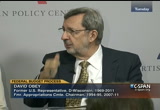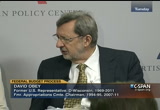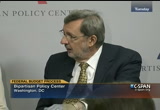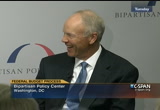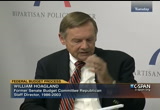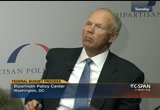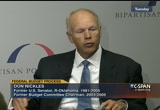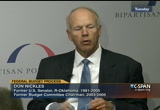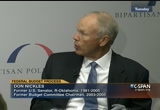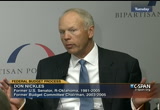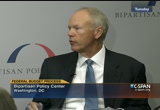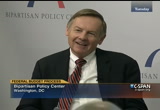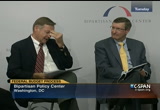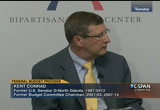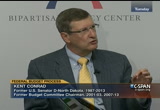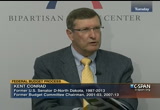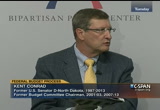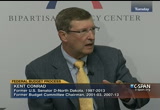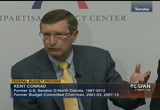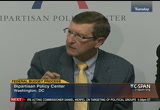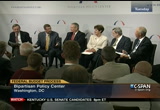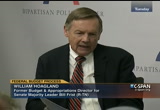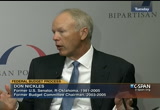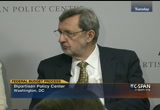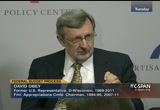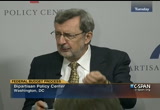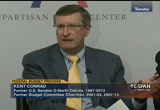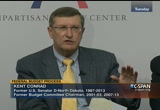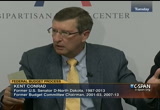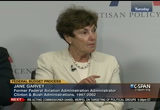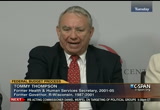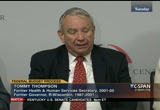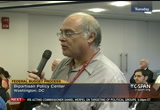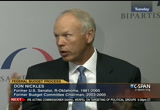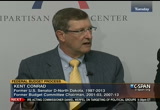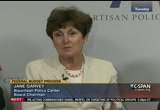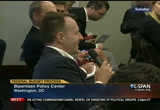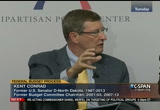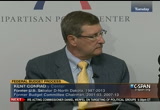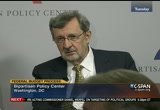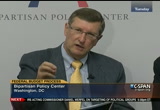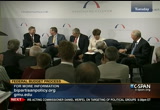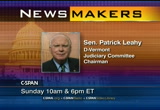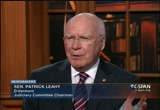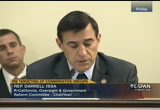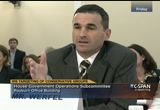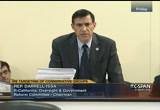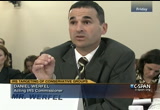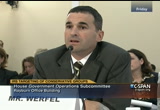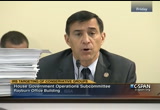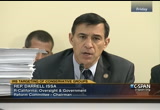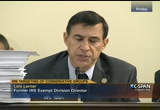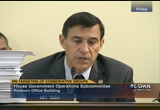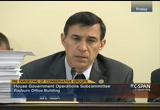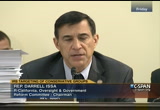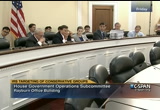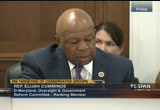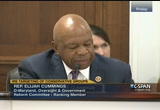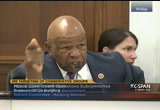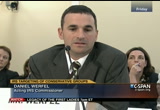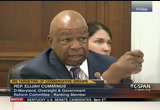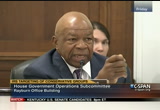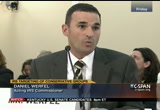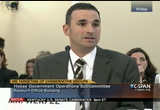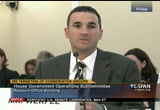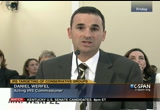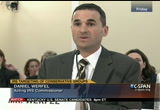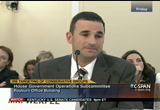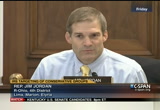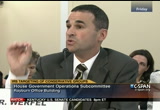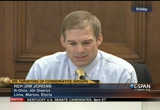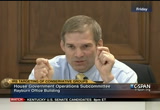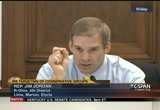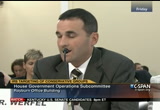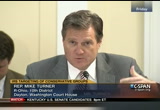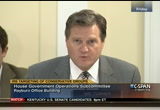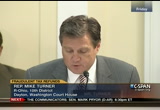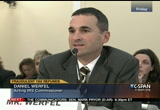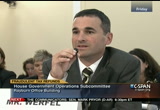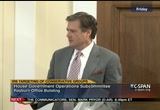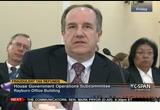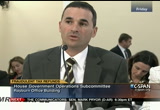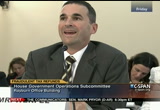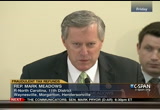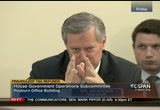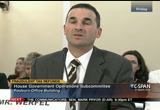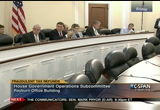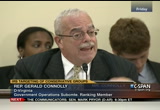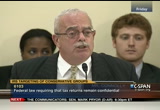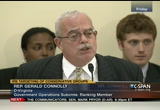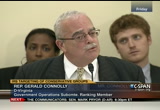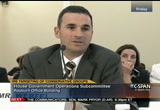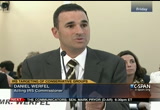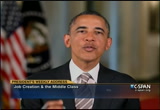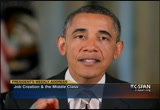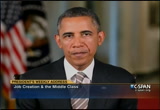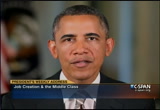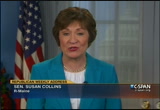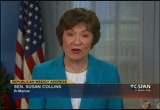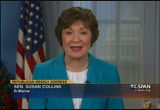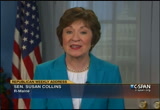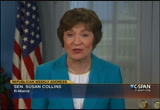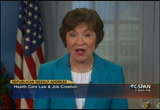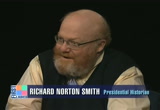tv Washington This Week CSPAN August 3, 2013 2:00pm-6:31pm EDT
2:00 pm
states that are not extending, about 21, also about 9 million people, and this is essentially texas, the most number of uninsured people in the united states, primarily through the this is essentially texas, the most number of uninsured people in the united states, primarily through the midwest, the entire south, the deep south, montana, idaho, miami, and utah.-- idaho, wyoming, and utah. there are some states that are still debating -- michigan, indiana, pennsylvania, a few others. i was thinking, where i want to be on january 1 is the four corners and with one arm in new mexico, another arm in colorado i'm getting this wrong -- arizona, new mexico, colorado, utah, and utah is the only one that does not have the medicaid expansion. host: there are differences depending on what side of the border you are on --
2:01 pm
guest: unlike the exchanges and subsidies, available to anybody in the united states, the medicaid expansion will only be available to those states that have chosen to do so. host: one of our followers on facebook says -- "health insurance would be as expensive as car insurance if it could be sold across state there.just an opinion how does it work from one state to another? guest: there is a provision in the federal health law that allows for insurance plans to be sold across state lines as long as the states sign the contract -- compactwith one another. that is actually an option. in terms of medicaid, you live in the state you live in and you qualify for your state medicaid program or you don't. there is a lot of confusion around medicaid and who actually qualifies for it. i think there is a general sense that if you are poor in the united states to get medicaid,-- you get medicaid, which is not the case at all right now. you have to be pregnant, you have to have dependent children, you have to be disabled. it doesn't matter how poor you are if you don't it into one of
2:02 pm
-- how poor you are. if you don't fit into one of those categories, you don't get medicaid. the medicaid expansion does away with the categories and says that if you earn a few 100 hundred 38% of poverty, $15,000 a year for one person, you don't have to prove you are pregnant or disabled. host: sarah varney is a senior correspondent with kaiser health news. we are also joined by mary agnes carey and jay hancock, also with -- also with kaiser health news. we are launching a partnership to dig into the federal health law and find out what it means for you. caller: thank you for taking my call. i feel that the fact that colonoscopies are going to be covered under the affordable health care act is a huge benefit. i don't hear that much being said about it. but right away i feel most
2:03 pm
people who are insured are going to save possibly 1500 dollars a year. that is what my husband and i will be saving, each of us. in addition to that, my husband was seeing his doctor at a medical building and he was complaining about his hands hurting. they sent him for x-rays at a place affiliated with the hospital and for taking a couple x-rays of his hands, we got a bill for $750, which flabbergasted us. i was so upset. but once it was submitted to our insurance plan the bill came back to $450, which is an example of how outrageous our islthcare system is in the-- and the expense that it is involved with it. we are currently paying, we have a family of three, about $900 a month. i am self-employed, making not much -- maybe $500 a month. my husband's income is close to $80,000 a year.
2:04 pm
two years ago, in order to save money, i went on a catastrophic plan, but it ended up not saving us money because we saved $100 a month previous to what we were paying on his family plan. but my deductibles were so high that all of a sudden it was really a bad decision to go that route. my real question for you is, will the family of three be allowed to -- if my husband can get discounted insurance rates, himself being on his insurance plan, and if i were to go on a separate plan and bring my son with me and be self employed, currently -- i am trying to figure out how we can save money. we are paying about $900 a month, which is a lot. host: let's ask sarah varney to start. guest: for a family of three, if you went onto the exchange, if you earned less than $18,000 a-- than about $78,000
2:05 pm
a year, you would qualify for a subsidy on the exchange. but if you went the small business route, i would ask jay. guest: they can separate out. you should explore all alternatives. i suspect your best options are going to be on the exchange. as i said, small business exchanges are developing a slowly than the individual policies on exchanges. but more to the point, i think the subsidies would be more favorable to you, looking at the individual policies. again -- i've mentioned it before -- go on google, type in "obamacare subsidy calculator," and you will go to the kaiser family foundation software that you can go through different scenarios, you can include only yourself, you can include your husband, you can do scenarios where you might file separately on taxes, and you can see what all the numbers would be.
2:06 pm
guest: can i weigh in quickly on the colonoscopy question? i want you to do a little reading. in cases where they are screening, they're covered. if it is diagnostic, sometimes they are not covered. if you go to our website, our columnist did a great column explaining some of the confusion that is out there. if you want to read more, the kaiser family foundation did a great paper, i think with the american cancer society, on colonoscopy coverage and the affordable care act. do a little reading and talk with your doctor about how the order will be written because that will affect the coverage. host: 2 questions on twitter that are related."if you have medicaid-level income in a state without the expansion, can you use the exchanges?" "if you are poor, what are your
2:07 pm
options?" guest: let's take the first one first. if you are 100% of poverty or above, you are eligible to go on the exchange. 100% of poverty for one person is $11,500 a year. you would go onto exchange and qualify for a pretty hefty subsidy. here is the problem -- we are not anticipating that the supreme court is going to say that the medicaid expansion was optional. if you are below 100% of poverty, you are not eligible for the exchange. there is a new doughnut hole in the united states. if you are between zero percent and 100% of the federal poverty level, there is no option for you. guest: it reduces the cost of the law to people into medicaid -- law to put people into medicaid versus exchanges. this is one of those things that if you had a health -- house- senate conference, which typically happens when chambers passed different bills, you would have the kinks worked out,
2:08 pm
but we never had that with the affordable care act due to the charged political environment and it was an unintended consequence. guest: i was doing a story for npr in the rio grande valley in texas -- one of our big partnerships is with npr. i spent time with a community clinic in brownsville where a lot of people qualify for the medicaid expansion, and i sat down with the woman who runs this, and she brought up on her computer a list of 4000 patients that currently go to her clinic. quite a number of these community clinics in the area. 4000 people in south texas would qualify for the medicaid expansion, which she as the director could get reimbursement for. they don't have any reimbursement method for them. host: our guests are all journalists with kaiser health news, and stories air on npr, national public radio.
2:09 pm
our guests also file for publications like "the philadelphia inquirer," "usa today," "the washington post." we are starting a partnership with kaiser health news exploring the health care law and what it means to you. let's hear from vince in minneapolis, was on medicaid.-- who is on medicaid. hi, vince. caller: hello. i wanted to go off of medicaid and suspend my social security payments because i want to go back to work to the bankruptcy court.because i still maintain my lawyer's license. i know from bankruptcy that there is a lot of people who filed a medical debts because of -- medical debts and it bankrupts them because of uninsured accidents. the aca does not address that at all. host: what happens to people who have had catastrophic medical situations, can't pay the bills, have to declare bankruptcy? can that still happen? guest: yeah, absolutely.
2:10 pm
the hope for those who support the act is that it will happen a lot less when employers are mandated to offer employees coverage, and individuals are mandated.-- individuals are mandated to have coverage. this should go a long way towards reducing medical bill- caused bankruptcies. there is nothing in the bill that would preclude bankruptcy from happening. guest: or nothing that, if you have had a situation where he-- you racked up a lot of bills, there is nothing that wipes out the debt. guest: not like mortgage debt, unfortunately. host: john in huntsville, tennessee, uninsured. john, you are on the air. john, are you with us? all right, let's move onto rod in plainview, indiana, was-- plainfield,
2:11 pm
i: two questions. i thought i heard somewhere that in the bill, the government has direct access to i think it was the insurance companies -- i don't know if you would call it bank accounts, but faster payments, claims, someone files a claim, there cannot be any denials by health insurance companies to maximize profits. can they have real-time access at the health insurance company and transferred to the doctor or -- transfer it to the doctor or the hospital? guest: there is -- the subsidy payments into directly to the-- payments would be sent directly to the insurance company from the federal government, i know of no provision that does anything to make any changes to health insurer pay the provider. that is probably company by company. guest: it is contractual. it depends on the company's agreement with doctors and hospitals, and i know of no provision where the government can intervene in the process, certainly not automatically on
2:12 pm
computer, other than the avenues that already exist. insurance is regulated by the states and you can protest of-- protest claims. claims will still be denied. the idea is that under the new rules, the denied claims will be much less than they used to be. you cannot deny coverage for pre-existing conditions. however, disputes with your insurance company have not been put into the dustbin of history yet. host: jim wants to know if you can talk about the importance of network and going out of network. if your doctor, health care facility, is considered in network versus something the company doesn't deem inside the network.is there any change because of the federal health care law in how this is decided?
2:13 pm
guest: a network is typically less expensive than out of network, but i don't know of any provision that changes how insurers decide that and what you pay. guest: there is no explicit provision in the law that talks about in network charges versus out of network, but the incentives in the law are changing for more providers and insurance committees are-- for what providers and insurance companies are doing. i think the trend is that the difference between in network and out of network are going to keep growing. earlier in the show we mentioned that a lot of insurers are setting up narrow networks of doctors and hospitals in the exchanges to get price discounts from them and to pass those along to consumers. it will be really incumbent upon you another consumers to read the fine print, pay attention, see what the differences between the in network charges and the out-of-network charges, and when you are seeking care, stay within the networks to the degree that you can't.-- can.
2:14 pm
there have been reports out there where if you go to the hospital and you don't have a choice, you can't shop around for provider, you are in the hospital and a doctor comes to see you and you find out that she is not in your network, that is a problem that will continue to be talked about. to the best you can, try to stay in network. guest: one thing we are seeing and california that is interesting is that i mentioned there are 13 plans are so not offered on the exchange. many of those were considered quasi-county-run plans. in alameda, where oakland is, you are with the alameda alliance, quasi-government-run talked about the public option. in california -- we will see if other states do this as well -- that there are sort of essentially public plans that are offered in many regions in california, and the way they were able to come in so low on prices to create these narrow networks, and with the local teaching hospital and community
2:15 pm
clinics, there are sweet spots they are going for. the caller you had just on the line with medicaid, used to going to the medicaid system and the community clinics but now they are in a little bit too much and will be able to stay with those providers.-- earn a little bit too much and will be able to stay with those providers. it is interesting -- in san francisco, ucsf, a teaching hospital, excellent hospital that also is a quasi-public hospital, will be included in one of these plans. the options are still quite good you they are very narrow. maybe just have a couple options in the plan. guest: you are seeing multiple networks, tiered networks, where one is the cheapest and you have a mezzanine network that is a little more expensive, and one that is really expensive.it is
2:16 pm
fine print. you need to pay attention. host: we have a californian on the line. medicaid recipient. caller: good morning -- host: we talked to already,-- to you already, rick? you've either been waiting very patiently or we have talked to you. caller: yeah, thank you, libby, for taking my call. last time i called, i kind of fell apart on the air and i want to thank you for your heartfelt empathy. my question for your guest is, as a dual eligible person, why wasn't dental and vision care addressed under the aca? guest: my guess is purely cost. they're currently in the -- the -- they are typically in the -- in the commercial market for most of us, they are standalone policies. some employers offer them, some don't.they will drive up the
2:17 pm
cost of premium.s -- premiums. we talked about this a little earlier -- insurance is not forbidden from offering it. it is just not one of the essential benefits, like hospitalization and prescription drugs and so on. my guess is that it is based on cost, but who knows? some of these companies can offer supplementary policies that would be affordable to cover this for you. host: we see on facebook this comment -- "obamacare will affect smokers the most."smokers are, in general, a lower-income people. that is what this facebook person writes. how do smokers get dealt with in the affordable care act? guest: they pay more. 1.5 times -- jay, do you remember? guest: i do remember the premium. there are some jurisdictions like d.c. and others as well have elected not to have smokers pay more. the district of columbia's decision was, look, we want to
2:18 pm
have smoking prevention treatment available to smokers, and by charging them a lot more that is a disincentive and it removes access. they made the decision to not penalize smokers. guest: no additional premium for smokers in california. host: oklahoma city. gregory's uninsured. caller: hi, i am unemployed but i also was an employer. one of the things i asked thousands of people as i was designing a health care plan in 2007, talking to people from all over the world, what country has the best healthcare? france was number one. i looked at that for a while, and then i decided as an employer, and all of you sitting right there, why are you paying for healthcare on your vehicle more than half the bill on your coverage is healthcare. why are employers so scared --
2:19 pm
why are we having employers, which i was -- why are they paying the outrageous cuts i had -- costs that i had to pay when i was a contractor? $100 to workers comp for every $100 i paid my employee -- why is it not included in all healthcare so that way, all of healthcare is under one envelope, and we will actually have a lot lower healthcare if you eliminate two things? one is the cost of the advertising the industry is doing massively. the other is the amount of money they paid politicians over those years trying to get rid of healthcare, because remember, they were advertising way before obama started this -- well, we only make 10% profit. yes, but you write off another 10% for advertising and another 10% you paid politicians. all of that money, including the people i ask in foreign countries -- why are you paying
2:20 pm
for healthcare on your car? host: gregory, hold on a second. stay on the line in case our panelists have follow-up questions. jay hancock, his expense as an-- experience as an employer looking for health insurance plans to injure -- insure his work force and what he's talking about? guest: gregory, you expressed the frustration that a lot of employers and consumers have with the system. it is expensive, as we mentioned earlier. i suspect that you and the four of us here could sit down and design much better healthcare systems than the u.s. has now. but as we said before, we work with the system that we have. there is still a group out there, not very influential, that would like to replicate the system, something like france and -- like switzerland, where they have private insurance
2:21 pm
companies but they are all nonprofits. that is not likely to happen in this country anytime soon. but in the world, there are still people who talk about it. guest: i was going to say that i was in vancouver looking at the canadian healthcare system, because there were all these ads demonizing the canadian healthcare system, so i said i would check it out and for npr i went up there. we talk about what providers get paid for their services. in canada, they sit down together and they basically hash it out. it is not a pretty process. there are people who win and lose. but if you walk into any physician's office in canada, they will have a book, no bigger than this, oh, that exam, that will cost $89. everybody pays the same price. that is one massive difference between the united states system and anywhere else in the world.
2:22 pm
host: more information about the exchanges -- is it true that each exchange will have at least two nonprofit countries offering -- companies offering insurance? sarah varney? guest: i don't know the answer to that.there were supposed to be two -- guest: the idea is that each state is supposed to have one. it is problematic in some seo --mississippi, in some oun -- some states and counties, there may only be one. there are multistate plans, which we haven't mentioned before. the people who designed the law and who wrote it foresaw the chance that in some parts of the country there might not be sufficient competition. there are provisions to have at least one nonprofit of the state plan and one for-profit of the state plan. they are still being implemented now. they are not likely to be rolled out on a national basis, as was the original intention.
2:23 pm
--t there are other backstops they are another backstop intended to bring in more competition into states that may be lacking them. another is the co-ops. the federal government, the law provided large subsidies to set up brand-new insurance companies in some states. typically these are blue states like maryland, california -- guest: they were stopped midstride. they got defunded. guest: so it won't be in every state. but the point is that there may be limits to competition and that is something that is going to have to be ironed out in parts of the country as time goes on. guest: with insurance the difference between the nonprofit and for-profit insurance is sort of a distinction without a difference.
2:24 pm
if you look at the difference-- rates between non-profits and for-profits, between anthem blue cross and blue shield of california and the for-profit -- the rates are very similar. they still pay taxes. this is somewhat of a misnomer that if you have a nonprofit participating in the marketplace, somehow they are not paying the ceo $10 million a year. he is doing pretty well even if he is working for a nonprofit. host: a few minutes left with our guests, all senior correspondent at kaiser health-- correspondents at kaiser health news. littoria, uninsured. caller: hi. i am disabled and on medicare. my question is about my daughter, who is 21 and in college.-- who is 22 and in college. i am not working.i'm on medicare. i have no healthcare coverage for her to be on. she has no income outside of we support her. come january we would love for
2:25 pm
her to have healthcare, we have been a great supporter of the law, but our state is not taking medicaid so i don't know what we are supposed to do to get coverage in january. with our state refusing to take the medicaid program. guest: my first question would be does her college offer any program for students? she could get coverage through mylege -- that would be first choice. caller: we tried that. didn't work. guest: since she doesn't have income, i'm thinking she would qualify for a subsidy on the health insurance exchange. you say you are disabled, is that correct? caller: mm-hmm. guest: you can't put her on your would be my next step. she is 22 years old and they have these young, invincible plans and i don't think you get a subsidy with those, but they are -- they could be more affordable whether or not there's any kind of other
2:26 pm
assistance to help her get that coverage, i'm not quite sure. guest: this is a good example of why the medicaid expansion is going to affect a fair number of people. it is quite significant. if she does not earn up to -- if she earns below $11,000 a year, she cannot go into the exchange and cannot qualify for a subsidy. it would be fantastic if she had either a part-time job or some kind of work she could get on campus where she can actually earn up to $11,500 and then she would be at 100% of the federal poverty level and go into the exchange and qualify for what i'm sure would be a pretty significant subsidy. host: under the law, her daughter will be mandated to have insurance next year. guest: yes. guest: except if you are in a state where they don't expand medicaid and you are medicaid, you could have gotten medicaid through the expansion. there are exceptions to the individual mandate and that is one of them. undocumented immigrants are exempted if the insurance costs
2:27 pm
more than 8% of household income. there are certain carveouts where you would not be penalized for that. host: what are some areas who who -- you are watching at kaiser health news for changes, development over the next couple of weeks? guest: we are watching how states are doing to sign up the young invincibles. the critical task of getting turnout for these pools. we are still looking at how the law is being interpreted. there are a lot of experts out there who suggest that some of the coverage offered by companies on the edge, companies that have not typically insured or given good insurance to their employees -- fast food chains, hoteliers, retailers, their coverage could be less than optimal and the law would allow that, and the record is still being written. that is something i am watching. guest: i'm interested in the states doing medicaid expansion
2:28 pm
expansion -- how they are reaching out to people we know there are people we know are eligible today for medicaid that are not currently signed up, for a variety of reasons. one is basically don't know. there is going to be interesting work with county jails and state prisons where a lot of these guys who are getting out of prison or jail are not eligible for medicaid. they tend to have a lot of -- nowc conditions. eligible for medicaid. they tend to have a lot of chronic conditions. i think it will be interesting to see how the states go out who are doing the medicaid expansion and reach the population. guest: i will be looking at th implementation process that sarah is talking about as well as the is the regulatory, how it is interpreted, and i follow capitol hill. host: better you than us. we have over 650 comments and questions on our facebook page about the federal healthcare law. you can see that conversation by going to facebook.com/cspan.
2:29 pm
all seniorwere correspondents. they will be visiting with us regularly on monday so we can figure out more about how the federal healthcare law is being implement it. [captions copyright national cable satellite corp. 2013] [captioning performed by national captioning institute] thee will have more on healthcare law with our kaiser news partners on mondays on washington journal. ,omorrow, our guest is dan balz who will talk about the 2012 election and his book, "collision 2012." picnic."fancy farm" joe gerth. and the national governors association meeting is underway into what -- in milwaukee. we will have jack markell taking your calls, tweets, and e-mails. all of that on "washington journal" tomorrow morning starting at 7:00 a.m. eastern time. press -- -- we bring
2:30 pm
events from washington directly to you, putting you in the room at congressional hearings, white house events, briefings and conferences, and offering complete gavel to gavel coverage of the u.s. house am a all as a public service of private industry. we are c-span, created by the -- orded by your local cable satellite provider. now you can watch us in hd. nationalmentioned, the governors association meeting is underway in downtown milwaukee, wisconsin. very near the milwaukee river. ment,, our next, live seg is going to be here on corrections. they will be talking about u.s. corrections. and tomorrow, we'll have another final segment, live, on cyber security.
2:32 pm
2:33 pm
home for this summer session of the nga, scott walker, being held in his home state. -- the host for this summer session of the nga, scott walker, being held in his home state. tomorrow, we will get a look at cybersecurity from the perspective of the governors. while we need for -- while we wait for this meeting to come together, we will take a look at what the governor had to say this morning on "washington journal."
2:34 pm
2:36 pm
>> just waiting for the room to fill up. some of the governors in attendance, their staff. the rest, we are waiting for them. we are running a little bit behind schedule. as we take a look, governor markel of delaware talking with what looks like it might be a rick porter and some other staff members -- runner markel -- delawaremarkell of talking with what looks like it might be a reporter and some other staff members. we will take a look at an interview with governor herbert of utah. we had a segment on infrastructure. you can see that at our video library. we will watch the interview with governor herbert. as soon as this gets underway, we will join it in progress. -- host:ur guest on s governor herbert,
2:37 pm
from the state of utah. thanks for joining us this morning. thank you. it's an honor to be with you this morning. host: there are so many questions about healthcare. can we get says -- a sense of how your state is implementing the affordable healthcare law? guest: healthcare is something everyone has been talking about for many years. it is kind of the watercooler topic of the day. we have not defined very well what we mean by healthcare reform. the affordable care act. it is causing a lot of uncertainty. there are a lot of questions. i think you have probably heard that this morning. in utah, we have tried to do estate approach. we have been talking about healthcare reform and actually created an exchange a number of years ago, before the affordable care act came into place. we have a healthcare exchange. we have annual healthcare
2:38 pm
summits. we're trying to make sure that we look at health care reform from the standpoint of improving quality, lowering costs, and improving accessibility. and frankly the outcomes in utah have been pretty good. we have the lowest cost health care in america and one of the i fifth or sixth rated quality of health care in the nation. so the contrast between costs to quality is pretty good in utah and we feel good about the path that we're going on as a state. host: the governor is with us only for a short amount of time until 9:15 or so. but if you want to ask him questions about health care, about these issues especially as the governors meet in milwaukee, here's your chance to do so. the numbers are on the bottom of send us tweets @cspanwj. the tribune this week put out a statement about how the
2:39 pm
state deals with the affordable care act. what's been proposed by your state? guest: you mean medicaid expansion?host: yes. guest: medicaid really has been a challenge for the states for a number of years. in fact, republican and democrat alike have lamented that it's causing increasing challenges for our budgets. the rising costs of health care, that's part of the impletuss-- impetus, i think, about talk about health care reform. with the supreme court ruling the medicaid expansion is now optional for the states. i'm concerned about the ongoing costs to the states and the tax payer with medicaid expansion. >> it looks like things are just about to get underway here. the topic at this session of the nga is the u.s. corrections system. >> we are going to get started.
2:40 pm
i know that all governors believe one of our most important and fundamental responsibilities is to keep our people safe. for years, it seems, the answer was about more incarceration. we saw what that -- the results from that. in the early 1980's, the state prison populations totaled about 370,000. over the next 30 years, the population grew by about 280%. it peaked at 1.4 million. inm 300,000 to 1.4 million 2009, when nearly one out of every 100 americans was behind bars. since 2009, those numbers have dropped slightly, but they remain at historic highs. driving this increase, by large part, were some sentencing
2:41 pm
policies, such as truth in sentencing requirements, three strikes laws, mandatory minimum sentences, that put more nonviolent offenders behind bars for longer. what we saw -- while we saw some reduction in crime, mounting costs have made sustaining that downward trajectory very difficult. over the last 25 years, corrections spending has gone billionroximately $16.5 to more than $50 billion when adjusted for inflation, an increase of more than 200%. it makes corrections the second fastest-growing statement -- segment of state spending, only behind medicaid. in delaware, we saw about a increasecrease -- 125% in the number of prisoners between 1980 and today and the corresponding growth in toenses, from $41 million about 261 million dollars, in a budget of just over $3.5 billion
2:42 pm
. fortunately, we had better understand -- fortunately, today we better understand what works and what does not work. we have better risk assessment tools to help identify violent offenders to help keep them off the street. we know more about the type of programs that reduce the likelihood that nonviolent offenders will recidivate. bettertead become members of society. we have better information systems, better social science, all of which can better -- improve our ability to manage our correction systems and improve the effectiveness of one program or the other. we have great public support for traveling -- enabling reform and support. according to a pew survey in majority ofst americans support sending fewer nonviolent prisoners -- offenders to prison. and reducing trend -- i
2:43 pm
mprisonment of nonviolent prisoners -- the majority of states have been able to enact reform driven by data and analysis, which is evidence-based and maintains public safety while reducing cost. in your materials, you will find background information on the series of actions you can take and questions you can ask your key advisers to help drive it -- improvements in your state. this information has been provided by the nga center for best practices. we have invited two leaders in the field to talk about ways that we can rethink our sentencing and correction practices. sentencing and correction practices. our first speaker is the director of the washington state institute for public policy. i asked how to pronounce his name. he said it is an old i'm a norwegian name. the a -- an old, norwegian name. the a is silent.
2:44 pm
these models have been helpful to a number of states in their reform efforts. welcome. thank you. help me welcome steve. [applause] >> thank you, governor and governors. it's a pleasure to be here to talk about the work we have done in washington state. over the last 15 years, we have reformed our criminal justice system, juvenile justice system, sentencing system, and some of our prevention programs, all designed to try to reduce the kramer -- crime rate in washington. the message in these few minutes i will have with you today is a simple one. it is that you can ask your staff today to assemble information for you that allows you to put that makes approach-- that -- that mix of programs together. evidence-based programs that work and that don't work. if you're spending money on
2:45 pm
evidence-based things that don't work, cut that out. you can ask yourself to put that information -- your staff to put that information together for you so you can put together a portfolio of policies that address crime. if you do that, what we found in washington, and i think you can get in your state, is lower crime rates then you have today and you can save the taxpayers money and there will be fewer victims in your state as well. this idea of putting together an effective, evidence-based list of programs, a portfolio of them, you cannot just put all your eggs in one basket. the institute that i direct was created by the washington -- there it is. the state capital of washington. that is the bottom of puget sound right there on one of the many sunny days we have in olympia, washington. thernor ainsley --
2:46 pm
governor's mansion is right next to the capital. the institute is up around the corner. that is the setting for the institute, where our job was created by the legislature in 1983. it is to carry out nonpartisan work. we have a board of directors, equal number republicans and democrats, house and senate members. do all the work that we comes about because the legislature passes the bill to institute -- tell us what to do on this stuff. study this topic and come back to us. the governor signs the bill. that's how we work. many of the things that we have been doing the last 15 years have been in the role of what i will call and investment advisor. we give directions in those bills from the legislature that says what works and what doesn't work to reduce crime. rank and order those things by benefit-cost analysis or return on investment of taxpayers. we have done it in k-12 education and child the blues --
2:47 pm
child abuse and neglect. you can see some of the other areas where we are actively pursuing this kind of information. the red -- legislature writes the bill, tell us what doesn't work, rank and order by return investment -- return on investment, and come back to us. i'm going to talk about crime, not other things we have worked on. the good news is crime rates -- i think we all know this. when you look at the numbers, it is very interesting. we can look at the united states and my state of washington. this is fantastic news. 45%e rates overall are down throughout the nation, very similar number in my state. they are down 48% of you just look at homicide rates. it is about the same number in my state. this is one of the great things about being an american these days, the crime rates are down from what they were in 1980. if you had visited seattle back in 1980 and you did it today, you and half as much hands -- he would have half as much chance of being victimized by a crime as you did then.
2:48 pm
it is pretty much true around the country. that's the good news. let's talk about prison. prison is the main -- major resources that -- the major resource that most states use to fight crime, along with policing. i'm going to throw out some incarceration rates that governor mentioned. 1930 to 2012, here are the incarceration rates. for the decades in the years before world war ii and the years after, the incarceration stood at about one in 1000 people in the years before television. after the introduction of the years of elvis presley, it was about one. it was a constant rate. that they did the -- that began to change in the late-1980's and 1990 past. we increased the rate on any
2:49 pm
given day. quintupled it. in my state, it was much slower than as the nation as a whole. all of the states pretty much adopted this as a way to address harms and crimes, but also as a way to reduce the criminality and amount of crime in the states -- the state of washington and others. if we had followed, in my state, the national trend, if we had stayed on the course of that blue line, we would have about $650 million in our budget. we have gone through severe budget problems and our budget would have been that much worse had we not adopted a different set of policies beginning in 1980. sentence people and what we do with them once they are sentenced. i want to talk about that shortly with you. what works? the legislature has asked us to identify what works to reduce crime and what does not work. when we get done, what we have adopted is one of a consumer
2:50 pm
report approach -- is sort of a consumer report approach. whether we are talking about education or child welfare or crime, we produce a report that looks very similar. we go through formal process to find out what is the best research -- what the best research indicates about what works to reduce crime or increase high school graduation rates, what does not work. what has been rigorously evaluated but does not work. and we rank everything by return on investment. where do the taxpayers get their best crime-fighting bock out of of theirbuck out dollars? i want to go through a couple items. not to bore you with too many numbers, but it's important to see what the information is. adult offender programs, juvenile offender programs, prevention programs -- all of those programs, prison, policing, the three peas in a pod, that is what we look at for
2:51 pm
our legislature. here's what we found. we found that in the prison system today, you can do a program called cognitive behavioral treatment am a a general class of programs. if you do this -- we're doing this in a big way in washington state, we found 38 rigorous studies that have been evaluated around the country that evaluated around the country to see whether that reduces recidivism or not. most of them were lousy studies. we found 38 studies you could hang your hat on in terms of research design. what those studies yielded is that you can expect, on average, about a 7% reduction in recidivism. heart was hoping for 70%. my head said 7%. that does not seem like a lot to me, but that is where the economics became relevant. the cost-benefit analysis, the return on investment analysis and that 7% reduction in crime generated about $400 to put a
2:52 pm
person and one of these programs, generating about $2300 in taxpayer savings alone and savings to the victims for crimes that never happened. this as bubbled up to the top of our list for our legislature and governor, in terms of things you can do once offenders are in the program -- prison system to try to reduce the criminal recidivism rate. betting person and investors best result you could hope for. we also did risk analysis. everybody should be doing risk analysis. these numbers involve assumptions, estimates. you want to test your chance that the program might go belly up. this is what venture capitalists do in the private sector. it's what we're trying to do in washington state. this is a very low risk investment, high return investment. we found a bunch of things in me pro -- the program.s s -- programs. some work, some don't.
2:53 pm
the ones that don't work, we stopped. funds, put them into programs that work or put them into other areas of state government. juvenile offender programs tend to go better. prison and policing -- i will help -- have updated results soon. and prevention programs -- the main point is you need to put together a portfolio of all those programs if you want to reduce the crime rate in your state not only next year but in the long term and to avoid the need to build prison staff, which i think we have reduced quite a bit. to repeati just want that point. this kind of information was not available 10 years ago, 15 years ago. we have been putting it together for our state. others around the country are putting it together. i think you can direct your staff to put that together here. what works? what doesn't? how to calculate a return on
2:54 pm
investment. if you do that, i think you can find, as we have found, that you can lower your crime rate more than otherwise would have been and save taxpayers money. i thank you very much for your time. [applause] >> i thought that was a great presentation. i think what we ought to do before we go to questions, i'm going to ask governor chafee to introduce the next beaker. then we're going to hear from a cup -- a couple of governors about what's going on in their states and have more of a dialogue. >> as former mayors and governors, we know that anytime you have a government agency that operates 365 days a year, seven days a week, 24 hours a day, it's going to be expensive. that is true with corrections. i'm happy to be here this afternoon to introduce an outstanding rhode islander, our director of corrections. he was asked to speak with you
2:55 pm
today because he has earned over many decades a national reputation for excellence in his field. his thorough approach to the corrections system -- he considers all sides, perspectives, and angles. he truly views the system as rehabilitative other than simply punitive. after graduating from yale and yell law school, he had his choice of careers, -- and yale law school, he had his choice of careers, but he chose to enter criminal justice and corrections. he served as an assistant district attorney in manhattan before joining the institute of justice where he directed the sentencing program for chronic offenders peak he then returned home to rhode island -- chronic offenders. he then returned home to rhode island to work on criminal justice matters. in 1987, he was appointed assistant director of the rhode island department of corrections, where he oversaw all operations and served as second-in-command. he was made an interim director
2:56 pm
in 1989 and appointed permanent director the following year. our corrections department is full-service. he oversees not only all of our state prisons, but the probation and parole services as well. it isisland -- challenging to be our director of corrections. we have a strong correctional officers union. the brotherhood of correctional officers here there is no question that he has a very difficult job. despite this, he remains at the forefront of corrections reform, constantly seeking out new, innovative, and effective strategies to improve rehabilitative services, minimize recidivism, and reduce cost. he will elaborate on some of his methods. but i can attest he is a reformer in the best sense of the word, not content to rest on past practices if they are not working as well as they could be. and there is a reason that he has served under republican and democratic governors. there is also a reason he is the
2:57 pm
longest-serving state corrections director in the united states, as well as the president of the association of state correctional administrators. it is because he cares deeply about what he does and brings a tremendous commitment to a very difficult job. he is an asset to the state of rhode island. i'm proud to introduce our director of corrections. [applause] >> thank you so much, governor chafee. that was a very generous introduction. name is intriguing. i should tell you my name is -- which probably tells you all you need to know about why i'm known as a.t. [laughter] as governors, you of course have a very large stake in corrections. it is your biggest stake in the criminal justice system as
2:58 pm
opposed to policing, which is local, to judiciary, which is not in the executive branch. the consequences of all those decisions lie on your plates. and in many states, including our own, it is the largest workforce in state government. one of the largest consumers if not the largest of state dollars. as well as the percentage of the budget. and it is done almost exclusively with state as opposed to federal funds. corrections directors, we know that we are responsible for public safety and institutional security, and we also have an obligation to the taxpayer to be responsible with their funds as well. i'm going to go in a somewhat different direction than steve did by talking about one of the court costs -- core costs of corrections. as long as there are institutions, this will be a major concern. that of course is healthcare.
2:59 pm
$10ur own state, over 1 in $10 intional -- $1 in correctional dollars is spent on inmate healthcare. in some states, it is greater than that. as budgets are scrutinized, there is a focus, and appropriate on -- an appropriate one, on the cost of healthcare for the inmate population. and of necessity you are generalists, not people that are going to have a great deal of subject matter expertise in every single topic for which you are responsible. it is a broad range that you cover. and i'm certainly no healthcare expert either. i am a career corrections guy. that, while is lack the capacity to get into the weeds on this, and you don't need me to and probably don't
3:00 pm
want me to either, what i hope i can give you is some headlines, as it were, based on experiences in rhode island and elsewhere, some take-homes. and we do have copies of want. there are changes coming to the healthcare landscape that we understand. i amact is that what describing our avenues that can be pursued right now, regardless of whatever else is going to happen. that youuld hope is would encourage your staff to pull together your corrections ,irectors, medicaid directors your health director or commissioner, and your director responsible for substance abuse
3:01 pm
and mental health to take a look at some of the areas that we will describe on the screens. if any of them look promising, to consider possible action. who are these people? let's bear in mind that corrections has an ironclad no refusal policy. in themy colleagues human services that we are the ultimate entitlement program. if the court says you have to go there, we have to take u.n.. we can can never say no. in.e have to take you we can never say no. majority of the people who come into the system are in the 17-39 year age range. in the cases of long sentences,
3:02 pm
they age in place. urban,e low income, disproportionately people of color, and their lives are very disorganized. their physical and mental condition makes it evident. most inmates have no healthcare insurance of any time -- of any kind. they are an unhealthy population. of all ofhigher rates these different kinds of diseases. you know there is also a constitutional entitlement to health care. if you are incarcerated inmate. a decision out of texas that was made in the 1970s.
3:03 pm
interestingly, even though per the supreme court's decision, inmates may be the only sector of the population which has a constitutional right to healthcare. it is also one of the segments of the population which by law is not entitled to healthcare insurance to pay for it. most of that burden comes out of state appropriations. does not pay the healthcare cost of inmates while they are inside. what is to be done? i think we have been obliged to take matters on ourselves and to come up with some creative approaches. what i call process improvements, electronic medical records, for example. all, it reduces the risk of medical errors.
3:04 pm
when one looks a liability in lawsuits, it is not necessarily in the area of use of force or in the area of access to programs. it is in the area of healthcare. liability for errors and omissions in providing healthcare. it is probably the largest sector of what we pay out in lawsuits. or what the state pays out in lawsuits. electronic medical records do improve care coordination. they improved the management of chronic diseases because it is easy to follow the tracks on the computer as to what kind of care has been given. they also reduce inappropriate treatments. medicaid management information systems probably exists in all of our states. that is the electronic process whereby medicaid claims our
3:05 pm
collective reviewed -- claims are collected, reviewed, and processed. if you can engage a third-party entity like your medicaid management information system to process correctional claims, what you can get is verification that the rate is appropriate, that the medicaid rate is what is being used for reimbursement when inmates are sent outside hospitals. at which point, they can be eligible for medicare. it eliminates the risk of overcharging. utilization review of hospitalization, i had no idea the fact is that it is not unusual for hospitals to keep an inmate for whatever period of time until somebody says, do you really still need to be housing and providing care to this individual?
3:06 pm
review make sure that inmates do not overstay and that additional charges are not unnecessarily imposed and and make sure they are only reimbursed for the dates -- the days they were there and diagnostic codes that correspond to their illnesses. negotiated rates of reimbursement for hospital care. nottes inside prisons do get medicaid. if, however, you are an inmate who requires hospitalization and you are in the outside hospital for 24 plus one hours, medicaid will kick in. on the 25th hour, you can be reimbursed for an inmate at medicaid rates. inmatetion, even if an is not eligible for medicare,
3:07 pm
when they go to an outside hospital, you can negotiate through your medicaid director the medicaid rate for that inmate. the medicaids, director can say to the hospital, we will only reimburse you at the medicaid rate for the care of that inmate. the advantage of that to the hospital is it is better than uncompensated care. services, inmates need to bear some responsibility for their health care. one of the ways in which it is done is to develop what we call chronic care clinics we find the walls. we have public health specialists, we have physician extenders, people who run these
3:08 pm
clinics and teach the inmates how to manage their own chronic healthcare needs in areas like , and to form as community of practice where the inmates will support each other in maintaining those habits so they do not have to go out and be sent to hospitals. we have specialists that, to the facilities in areas like orthopedics, gynecology, podiatry, castro enter a a -- gastroenterology. they can see a cluster of patients all at one time. these solutions avoid the cost of transportation. when i told to the cost of health care, i was not including the costs of the custody necessary to the inmate to the hospital and watch them 24-7 while they are there. jacks up the cost far beyond the 10%.
3:09 pm
medication and equipment, purchases through pharmacy management companies. there are companies out there that operate on a national level that will drop ship on a daily basis. they have the capacity to provide a whole lot of management information that prescribing on medications in a very sensible and cost-effective way. utilization review of the drugs, if you have a pharmacy school in your state, i would encourage you to reach out to them and engage them in a contract. the purpose is to provide utilization review to provide a professional perspective on the dosage is being given, on the amount of drugs and the types of drugs and to work in connection with your pharmacy provider and your healthcare director to make sure this is being done in a
3:10 pm
most fiscally responsible's fiscally responsible fashion. there is a consortium that operates primarily in the west, but our state joined it, in which we combine our buying power in the area of medical equipment, for example. we get discount prices because we are buying as a single entity. the truth is that 97% return to the community following their incarcerations. recidivism rates vary, but they do tend to be significant. inmates sometimes are at their healthiest at the end of their term of incarceration. they spiraled down very quickly upon release. why should that concern us?
3:11 pm
rates do suggest that within three years, upwards of 50% will be back in our custody. if they have not attended to any of their healthcare needs, it is a reason they will come back and they will come back in worse shape and will cost more money. parole such as medical are being considered in a lot of states. somebody whose condition is a reversible and likely to result in death within six months is eligible for parole. somebody whose health is going to be irreversibly declining to the point where they are bedridden or wheelchair-bound permanently would be another example of somebody that we might that equate parole. a key is better healthcare coordination upon release. that kind of successful linking to health care issuesin our owne
3:12 pm
paid as much as $2 million for a state funds.t off i suspect that if you were to members, youbinet would find similar cases in your state. arethcare costs inextricably intertwined with the size of the institutional population and the overall cost of running and staffing facilities. a number of states have looked at those larger issues and risen to the challenges of figuring out how to manage the growth of the population, even decrease it, while enhancing public safety and saving money. it is an exciting time to be in corrections. i set it as a guy who got his start on the line 37 years ago -- i say that as a guy who got his start on the line 37 years ago. reduced cost,ces,
3:13 pm
achieving successful public safety are out there and my understanding is we will be hearing from some governors about their own experiences shortly. i am really looking forward to hearing what is going on in other states. it has been successful in my own. thank you very much. [applause] >> i want to thank both of our speakers. presentations were excellent, very educational. -- both presentations were excellent, very educational. i would like to asked governor do guard and abercrombie to talk about the work that is going on in south dakota and hawaii. >> thank you, governor. in january of this year, south dakota legislature approved a number of primitive justice
3:14 pm
reforms, a pretty comprehensive package, that were sweeping in scope and substance and really very far-flung efforts on our part that we had been year.aking for about a we are hopeful those reforms are going to work to save our taxpayers dollars while keeping our public say. i want to tell you about what we did. you may be interested in that, in doing something like it in your state. the policies we changed included new or improved probation accountability programs that employ both regular and random drug and alcohol testing. we restructured our sentencing framework for nonviolent offenders. we made the largest investment in the history of our city in behavioral health for offenders with addictions and mental health needs.
3:15 pm
there are many other things that we did as part of this effort. i am sure you will hear about some of these same policies from governor abercrombie. we used some of his ideas, in fact. i would like to talk about the process our state followed and how this issue garnered a pretty broad support through the development process, the passage of the legislation, and even today as we execute it. i learned several years ago that our state had a higher imprisonment rate than most of our neighbors. in fact, all of our neighbors. per capita, we lock up 75% more men than north dakota. north dakota is very similar to south dakota. agriculture state, pretty similar. that surprised me.
3:16 pm
we incarcerate four times as many women as minnesota does. ien i first heard this data, doubted it. i thought, that cannot be right. we are not that different. we are probably counting differently. as i looked into it, no, that was not true. we truly were incarcerating people at a much higher rate. maybe we are doing it right, maybe they are doing it wrong. maybe we are safer because of that. you lock up more bad people, less crime. that was not true either. i thought we really need to look into this. past 10d that over the years, 17 states have lowered their imprisonment rate. all 17 of them have also lowered their crime rate. the crime rate in those states
3:17 pm
have fallen twice as fast as the crime rate has fallen in south dakota. our approach was not working, it was not at her, and her high rate of imprisonment was also very expensive. if you look at what that has done to us over the past 20 years, our spending on corrections had tripled. he grew faster than every area othernding in our state than medicaid. it was going to cost our state to have to build a new women's prison.nd another men's to cost us in terms of construction and operating costs over $120 million. for a small state like ours, with a very small budget, that is a lot of money. following 2012 legislative tosion, i directed my staff start having some eh
3:18 pm
meetings wh volved in the criminal justice system in south dakota. we had over 35 meetings with over 400 stakeholders from law enforcement, judges, defense attorneys, prosecutors, american tribal law enforcement, judiciary, treatment providers, probation officers, supreme court justices, lower court judges. everybody that was connected in any way with the criminal justice system. and we listened. we did not come to them with ideas or solutions. first, we need to learn. everybody has their opinions and ideas from their own experience. all of us have limited experiences. we tried to draw on all of the stakeholders, realizing they have their own narrow viewpoint of the world based upon their experience. we wanted everyone to hear from one another.
3:19 pm
wehave lots of information gleaned from the stakeholders, lots of opinions, lots of anecdotes, lots of facts. it was very helpful and useful. did not go with a particular solution in mind. we started just by listening. after three months of stakeholder meetings to learn about their ideas and their experiences, we formed a work group that included legislators, members of my staff, representatives from a cross- section of all of the stakeholder groups. there were 18 members in total. the group is charged with three goals. these were the overarching goals. do, safety first. improve public safety. whatever recommendations you have for reform, if you have any, at the end of the day, they must improve public safety.
3:20 pm
second, we still have to hold offenders accountable. about being soft on crime. it is about being smart on crime. we have to hold offenders accountable in a different way. the third charge was to save money. they were careful to define what they would not do. we will not -- we are not interested in discussing the root causes of crime. we are not interested in looking at drug legalization. we are not looking at the death penalty. all of those issues have a relationship to criminal justice, but this is not what we are looking at. the work group reviewed south dakota data and looked elsewhere for evidence-based practices. we do not need to reinvent the wheel if other states have identified practices that research has proven to work, let's use those practices rather than trying to invent something new.
3:21 pm
adoptedcies that were or recommended by this group were really truly developed in a collaborative fashion. lots of input from all of the stakeholders. all driven by those three goals of keeping the public safe, holding offenders accountable, and saving money. one thing we learned from our facts gathering was a large percentage of the prisoners that we were putting into prison in any given year were nonviolent offenders. we were locking them up, using the most expensive means for responding to accountability, not because we are afraid of them. we were just mad at them. we were using the most expensive way of holding them accountable. after the group finalized their policy recommendations, we went to work and we contacted nearly
3:22 pm
every legislator to explain the beenem, the process we had going through, and now the solutions this work group had put together in a formal package. with their solutions, we went to work on amending any statutes that would be affected by the policies. legislative approval would be required. we also contacted the stakeholder groups again. the sheriffs, police, judiciary, the victims groups, all of the stakeholders we had been talking with and you had representatives on our workgroup and asked them for support, their endorsement of the policies we recommended. and aa couple of months compromise with the prosecutors group, we had a package and a coalition. in the end, the public safety improvement act was sponsored by
3:23 pm
70 out of the 105 legislators. endorsementparties and sponsorship. it was formally endorsed by the chief justice, the attorney general, the police chiefs association, the sheriffs association, the county commissioners, the state's attorney, the victims network, the council of substance abuse and the family council. we have been in touch with all of these groups and sent their regular updates. this, i think, was crucial to having them endorse and support the legislation. by undertaking this inclusive palms up efforts with no preconceived notions about what we were pushing -- because we wee not pushing anything -- were able to enlist the support
3:24 pm
of all the stakeholders. when stakeholders are comfortable, legislators are comfortable. the package i would say is among the policies i am most proud to have supported and seen in my first three years as governor. it shows the value of collaboration and that process is important. both parties were involved, effective stakeholders work involved, and it is fiscally prudent. i would be remiss if i fail to it knowledge a major partner in our efforts was the pew center. we applied to them because we are aware they had guided other states toward criminal justice reform. they did not offer a cookie- cutter solution because our solution was dependent upon our situation. for example, i do not know what the percentage of new incarcerations in wisconsin are made up of violent versus nonviolent. each state is different.
3:25 pm
waslieve their solution really driven by our stakeholders and by our situation, our data, and our laws. they chose south dakota as the state to which they would offer technical assistance. they were especially helpful in data analysis. data andial system helped us look at it in different ways. asould recommend them partners if any of you decide to advance an effort like this in your own state. i want to reemphasize, this is not an effort to be soft on crime. it is about smart on crime. we want to hold people who offend accountable. we want to help people avoid reoffending. so many of the people we are incarcerating were drug and alcohol addicted. some of their crimes were crimes
3:26 pm
of abuse of those substances. they were not hurting anyone, but they were violating our laws. they were violators and they had to be held accountable, that we .se presumptive probation we use evidence-based practices that hold them accountable. of --re swift sanctions proportional to the probation or parole violation. they are held accountable in ways that help them learn not to reoffend and reward them for good behavior. approach toot stick those who have addictions. it does involve some investment up front and over time, but it is a lot cheaper than building prisons and operating them. what more could we want? we save money, we hold offenders
3:27 pm
accountable, and we believe it will drive our crime rate down. it is a win-win-win situation in south dakota and time will tell if i am right about that. i hope so. >> thank you very much. he had a lot of experience with chronic offenders. i suspect that makes us a good group for you to be speaking to today. i suspect all of us are guilty of that in one way or another. is other reason i got picked i am a fellow probation officer. you are still going, but they got rid of me early on. that experience helped bring a certain perspective now that i
3:28 pm
am governor that is not available to others. not too many probation officers and up -- end up in the governor's chair. in that context, which i'm sure you can verify, you get a pretty eclectic view of the criminal justice system. when you begin every day of your working life at a booking desk, it gives you a certain view. with case, dealing both making recommendations as well as supervision, traffic tickets to murder, you do not find yourself sideload. -- sidloed. elements inrincipal
3:29 pm
my campaign to become governor involve the criminal justice system. what happened in previous administrations, both democrat and republican, was unable to find a site or sites or the will in the legislature to build new or additional facilities. we started shipping prisoners out of the state. that is the way we handle that. the public-private partnerships were established and people went into business. we house prisoners. real estate investment trusts came into existence. we will take prisoners and we will treat it like rent. we will even get into arguments with the irs about whether we should pay taxes. human beings got turned into rei
3:30 pm
t elements. up spending tens of millions of dollars a year to ship people out of the state just to get a planeload of people out of the state was a quarter of a million dollars. course, ised, of because there was a high percentage of those who were prisoners who had native , highan background percentages of social disorder resultingic travail in high incarceration rates as well is offending, they were cut off completely from contact with families. we had a circumstance where one
3:31 pm
of the things i said, i wanted to get all of the prisoners back into the state so we could begin that. in theme an element campaign as to whether that was a good idea or how foolish that was or what was i trying to do. when i was elected governor, i found the same phenomenon. over the 10 years before i became governor, the state prison population grew 16% the the crime rate was decreasing. departments to the of public safety increased 63% over that time. , onehird, 1700 people third of the prison population was housed out-of-state at tens of millions of dollars. all of those dollars leaving the
3:32 pm
state. was not invested either in personnel or facilities or anything else. it was leaving the state. for technical assistance from the council of state governments justice center, the pew center, and the u.s. department of justice. we did a combination. i want to say there was a comprehensive analysis done. we did the same thing as the governor indicated. we went to all of the stakeholders, including the legislature. let's get some data-driven information. everybody has an opinion. everybody has an anecdote. -- theee if we can get
3:33 pm
people who came, do not be suspicious right away. we have our unique and special circumstances and nobody can come in from outside and tell us what to do. nobody from outside came in and told us anything. what we discovered very quickly, this was a good objective resource. they have no axes to grind, they had no preconceptions. byy understood it was state state and region by region and they were terrific. excellent. of course, there were all children. everybody is a child these days. number of young people, and perhaps it was their innocent demeanor or something that allows everybody to think they did not have an ax to grind
3:34 pm
or a special interest to pursue or that they were not soft on anything. it was being hard on the taxpayers. that is what the problem was. they did a comprehensive analysis. --t they identified inefficiencies and the system -- they recommended policies inefficiencies in the system and they recommended policies. we did not come in with the idea that here is a whole bunch of new expenses you have to make. quite the opposite. look, we're dealing with stuff that is costing us money. when i went to the legislature, i was not asking them for new dollars. we will save this money, but let me invest it. ,ee if we can invest this money $3.5 million.
3:35 pm
we would increase efficiency, increase public safety, reduce recidivism. we passed legislation to effectuate that. i think we have put out some , i hope thato you got passed out. i will highlight a couple of things. of thehighlight a couple things we found in terms of inefficiencies. to everyhis applies state, i do not know, but i am willing to bet some of these things are ubiquitous to all of us. i mentioned we had a declining crime. inefficiencies in the criminal justice system were really terrific. it had not occurred to me that
3:36 pm
our process -- are pretrial process was the longest in the nation's. pretrial process was the longest in the nation. bailiffs. they were just sitting there and that cost a fortune. of dollars onons totally unnecessary pretrial delays because we have not not assessed anybody as to what the situation was. complete required program and never benefited public safety. failure to put the right people in the right programs aced on hard-core reid ribble -- based on hard-core research. we released people back into the
3:37 pm
community without any follow-up supervision or monitoring. i am speaking as a probation officer in that regard. restitution for victims was not being adequately collect it at further discourages the public. reduce delays in the pre-child process. we went to work on getting -- reduce delays in the pretrial process. reinvesting the $3.5 million right act into the system. i will tell you very quickly about how we did that. , toegan to hire people carry out these programs with a very good way of doing it. we had about 1700 people out of the state.
3:38 pm
theanalysis found that unnecessarily delay contributed to one hundred 17% increase in the jail population in the five years previous to my administration coming in. increase, it was astounding to me. let me summarize as quickly as i can. the 3.5 million -- let me tell you what we did with that. we hired additional corrections staff right from the beginning. we hired public safety department, we established a research and planning office within public safety. and then we added 15 new staff positions for victims services.
3:39 pm
this is the public -- this is something the public can see right away. that was visible to the public to try -- to create trust so that they are willing to give us a chance to reinvest that money and not think that it was all -- that it was all going to incarcerate people. this increased staffing resulted in restitution collection, increased community supervision and treatment resources with a high risk of recidivism. up with a to finish practical demonstration of what we did with the courts.
3:40 pm
we worked with-- the chief justice and the judges. i cannot emphasize enough how important it is to bring the judiciary system in. it is not crossing any constitutional lines by bringing in your chief justice and the appropriate family court judges and administrative judges into work. they will welcome it, in fact. governor,lator and a a lot of times -- the only time we see anybody from the judiciary is when they come in with their budget. otherwise, there is not much in the way with discussion. seen ast want to be interfering with the justice system or so on. it was very helpful to do that. situation, iular think you will appreciate this in terms of expenditures, , about $1000 a year
3:41 pm
per person. the whole program that i reference and here, that is about $1500 a year. -- just do not do drug courts. you will get tangled up in a whole bunch of problems because you have high risk and low risk. that jumps to $6,300 a year. you,s, i do not know about but our prison beds cost $46,000 a year. 46,000, can you imagine if you spent or a $6,000 on making sure -- youu had preschool spent 46,000 dollars on making sure that you had preschool and they had proper nutrition? we thought we were able to make
3:42 pm
a real case for this change. this, annclude with article by a judge from our state, who is the chief instigator and supervisor of the probation court and the drug court. i will read you a couple of things that i think helped convince the legislature that this was the way to go. inevitably, you are going to get people who criticize a justice reinvestment initiative. that is what we call it. governor, you had the same he did not call it reinvention, we did not call it reform. we talked about reinvestment. it would pay dividends to the public.
3:43 pm
in order to make certain that people did not misunderstand that by having a hope port and a drug court, that we were going easy on anybody. let me summarize to you very quickly what happens when you offenders. centered judge proposition. "come at you put the probationers in there expectations remain clear right from the get-go. swift, they take place right away. the judge is available. the bailiffs are available. of the hearings are held within 72 hours of arrest. 70%. drug treatment is provided by those who request meant or say
3:44 pm
they can't stop using drugs or alcohol on their own. the judges supervise a large probationers. in -- felon probationers. the judge supervises 2000 felony probationers. they target the toughest offenders. judge -- if you have 2000 offenders in front of you, you let them know exactly what will happen. we see to it that the judges backed up. they understand very quickly what it's going to happen. , then weannot make it get to the drug court situation. treatment resources for moderate and high risk offenders.
3:45 pm
it costs between $5,000 and $8,000 a year. the results are very good. since september 2012, we make sure they understand that this is the last chance privilege. going to beis rigidly enforced across the board. since september 2012, there have been two drug court graduations involving 41 offenders. instead of costing hawaii almost $2 million in combined prison .ost, these 14 are now employed we have been following them since september of last year. everyone is employed. they have paid $21,000 so far in restitution costs.
3:46 pm
it is not a whole lot of money, but it is a lot different than spending $2 million, none of which has achieved anything. we are not saying this is a panacea. we are in the process of trying to make this work. i brought several hundred prisoners back to hawaii. --ntend to get all 17 that's i will bring the rest of them back, but i can tell you that if -- it isw up on what not just the two of us. there will be a public safety performance project report indicating the six
3:47 pm
things. what motivated you to tackle this issue in the first place? how did you achieve a consensus across the political parties? what were the major obstacles? how did you get past them? what part of the states reforms will have the biggest impact? why do you see a shift in public attitudes towards crime and punishment in your state? what advice do you have for other governors? i can speak for the governor and myself when i say, the principal advice we have, think about it as justice reinvestment and act accordingly. thank you very much. >> thank you, governor abercrombie. you for your remarks. he wanted to make sure indiana was the worst place in which to commit a crime, the best place
3:48 pm
to get a second chance. it is an interesting sentiment. it does often come back to until health. -- mental health. ofs whole issue administrative segregation. easier and perceived as less risky. people withsing significant mental health issues directly from years of isolation, which only exacerbates the challenges they have. they are deemed too risky to be -- they keep them in solitary confinement. a release them directly into the general population of the community. percent ofto seven our total prison population was in minister at of segregation.
3:49 pm
that was an appalling number. when you begin looking at it, so much of this is connected to mental health. the worst thing you can do to someone who is emotionally unstable is to lock them up i themselves and leave them there. -- by themselves and leave them there. state, as an example, to have such a lower level of incarceration, the kind of thing you are talking about in south dakota, drug crimes have to be treated very differently than they are treated in other places. of a change in sentencing? what are the other things contributing? >> the legislature adopted in 1984 a new sentencing system
3:50 pm
that is still in place in washington state. it focuses on the risk factors. the people in prison now have a higher risk by the nature of the sentencing grid for violence. that is the key thing. that is why we have a lower rate of incarceration than other states. we have more crime control because of the prison because we are using it for the highest risk offenders. including drug offenders. we have had some success in shortening length of stay. we have had some non-successes in doing some of that work, too. >> there is another factor that is involved in terms of incarceration length of time, having to do with drugs. that depends on whether or not ,hey are methamphetamines
3:51 pm
crack, the propensity towards violence and/or the occasion of the person being in court as a result of their addiction is not , but as aion per se result of some violent crime. an act of violence associated with being mentally and physically dysfunctional because of the methamphetamines. -- cocainedealing was not even a big deal then, certainly not crack cocaine. you were dealing with heroin and toxicity ofd the the marijuana was not anywhere near what it is today. drugs in and of themselves have changed dramatically in terms of crimesy and the types of associated with drugs have
3:52 pm
become more violent. therefore, the penalties associated with a particular skew and easy assessment of what constitute drug crimes. >> i can talk a little bit about south dakota situation. as we look into our folks being incarcerated, most of them were nonviolent. of thoseercentage nonviolent offenders were drug or alcohol crimes. just the crime of use or abuse. when we look into the drug crimes, we realize that there was no differentiation or very little differentiation between distributor,the and the manufacturer. the guy that was just caught
3:53 pm
using was treated very much the same as someone who might be running a meth lab and distributing the product. we tended to treat all of them quite harshly. one of the things that was done ,as to differentiate the crimes andce the user penalties, for the more egregious manufacturer or distributor, we increased them. that was part of the give-and- take that some of the prosecutors to get their support. the vast majority of those folks we are putting into prison were mostly users, low-level users. instead get them on a presumptive probation, with swift sanctions, evidence-based that if you shown
3:54 pm
treat them in their communities where the risks of using it constantly presented to them, versus put them in prison and treat them where they have no itess except to contraband, is kind of silly to think that if dennis goes to prison and i am addicted and i get treatment in prison and i have no opportunity to reoffend. and then i am put out in the community, back in the same circles of friends and the same environments where i was tempted before, the likelihood of being able to resist re-offense is lower. if you can treat dennis and the --munity and reward him every 30 days of good behavior gets 30 days off there probation sentence. or of their parole sentence. if i am near the end of my month
3:55 pm
and i have been 28 days clean uddy says, let's go out, i've got some meth. be rewarded for saying no. pretty soon, it can become a habit. thatin the community were inflation is presented. that is one of the philosophies behind using the swift and sure positives type i described, but also negatives. if i get caught using, i will go to jail. i know what my jail sentences going to be. it does not result in the reimposition of the entire prison term for which i was sentenced and in part of which was deferred. i do not lose it all for one small infraction. i lose some.
3:56 pm
those are some of the philosophies behind the reinvention that we passed in the legislature. virginia, we used the justice center also. all three branches of government working together. i was able to have a bill passed the legislature and it differs a little bit. we talked about early release for good behavior. the early assessment to make sure the inmate is getting the correct treatment a need when they go into the prison. we have a high amount of substance abuse. to assurer plan is that they do get the kind of treatment while they are incarcerated. another thing that we have not done in the past, there has not
3:57 pm
been a real plan once the inmate 's time is finished. they walk out on the street and they go right back to the same environment that got them in trouble before. rules whileow the they had been behind bars, they will be allowed early release, but it will be supervised release for the remainder of the term. if they still have problems with substance abuse, the treatment will be provided for them. the shockso treatment. if you have minor infractions while you are out, the first time it happens, you will go directly back to 30 days. if you come back out, it will be 60 days. the third time, you will go back for the rest of your term. i think the fact of having the supervisor making them follow strict rules, it will help them
3:58 pm
as far as recommitting crimes. lawyersthing, so many -- so many employers are -- will not look at hiring felons. if you give this person a chance and they happen to go astray, we will reimburse the employer. to find these former inmates employable. ace again, if you do not have way to support yourself or your family once you are released, you have a tendency to get back into breaking and entering were dealing with drugs or whatever. that is another part of it that we have to deal with. once they are released, how do they go about supporting themselves? , i like a lot of
3:59 pm
the ideas i have heard here today. i would like to cut down on my workload and i am wondering if i can get some information from the state of washington or south dakota on some of the conclusions that you have arrived at through all of this analysis. i would be interested in seeing anything that you have. chairman, if, mr. we have some kind of work going on through our best practices on corrections, if there is something available through in nga? >> we will have staff circulate some of the best practices you heard about today, also picking up on the comment the governor made regarding indiana. worst place to commit a crime, but best ways to it a second chance.
4:00 pm
in terms of what states are doing to make sure folks coming out have a decent shot of employment. that continues to be an unbelievable source of frustration. it is not a surprise the recidivism rate is so high. they have so little hope of finding employment when they get we will definitely have the staff pull together. much of this work is going on in rhode island and other states as well. i think there are quite a few states. we also did the justice reinvestment initiative work in delaware. .e are implementing it now we signed the bill probably a year and a half ago. it is just -- i think for all that we are seeing
4:01 pm
crime go down and incarcerations go up, the unbelievable increase in spending. if you spend that money, the $46,000 you were talking about per inmate and what we could do with that if we put it in other think this is a very interesting conversation. i want to thank our speakers for coming in. to the governors as well. we will make sure that we circulate the information to the governors. thank you all very much. [captions copyright national cable satellite corp. 2013] [captioning performed by national captioning institute]
4:05 pm
nationalvernors at the governors association have one more day of meetings. tomorrow, they will have their closing session and talk about the states' role in cybersecurity. we will have live coverage p.m. eastern.:15 yesterday, the governors join veterans for a bride groom the walkie to the harley davidson easy---a ride through milwaukee to the harley-davidson museum. iowa and theof governor of mississippi, south dakota's governor, and utah's
4:06 pm
4:08 pm
4:09 pm
havee are so pleased to you here at the national governors association here at this gorgeous harley-davidson museum. have a medal of honor recipient with us here. we are so pleased to have him here with us this evening, riding side-by-side with the governor. it is my great pleasure to introduce a tremendous individual, a fantastic loss.
4:10 pm
he is wisconsin's biggest cheerleader. he is a reformer. he is an avid packer fan, and extraordinaire. please welcome governor scott walker. [applause] >> you guys ready to have a good time? of honore our medal winner a big round of applause. about all the combat veterans that route in with us? let's give them a big round of applause. [applause] joined -- and you may not be able to see them because they are in camouflage -- but our top leadership of the wisconsin national guard and our two brigadier generals with us tonight, thank you so much for being here. [applause]
4:11 pm
with the pledge of allegiance and get onto the party, a a big thanks to all the road guards and rode captains in the bright orange shirts. it is hard to not see them. let's give them a big round of applause. [applause] and a big thanks to law enforcement that rot us in, the .isconsin state patrol let's give them a big round of applause. [applause] to have ae are going moment of silence. if you look down there, we are going to clear this way. wisconsin state the troll honor guard is going to join us bringing in the colors. medal of joined by honor recipient gary wetzel as l.ll as governor jack markel
4:14 pm
thereernors and veterans in milwaukee last night during the summer meeting of the national governors association. more lives c-span coverage of the nga tomorrow, 12: teen -- 12:15 with a discussion on cyber security. >> when did we reach a point where you have a certain philosophy because of the color of your skin? when did that happen? [applause] you know, a reporter once asked me why i did not talk a lot about race, and i said, "because i'm a neurosurgeon." [applause] they thought that was pretty strange. i said when i take someone to the operating room and i cut this scalp and take down the bone flap, i'm offering --
4:15 pm
operating on the thing that makes that person who they are. the cover does not make them who they are. when will we understand that? >> surgeon and author ben carson takes your calls and tweeps sunday at noon eastern on " .ooktv" on c-span2 >> a look at the challenges and processes behind the budget process. this is hosted by the bipartisan policy center. about an hour and 10 minutes. >> ok, good morning. session, which we are calling budget on the brink, cosponsored by the eye partisan policy center and george mason university center on public
4:16 pm
service. i'm the director of the public administration programs at george mason, paul posner. this is part of a larger project which we are taking to probe the history of budgeting over the past 40 years. the past decades have not been uneventful for budgeting, between deficits and surpluses back to deficits again. while today's economic ties are slowly lifting us out of the recession-induced deficits, government leaders are mired in almost unprecedented gridlock the seems to threaten appropriation and continuity of government itself. it's no wonder why we call this session "budgeting at the brink ." mark twain once said that history does not repeat itself, but it rhymes. it is useful periodically to look back and move forward. and our today's challenge is
4:17 pm
truly novel, or it do they represent a previous battle? what can we learn from previous issues to resolve our current seemingly intractable budget situation? that is really the focus of this meeting. we did our first session together in november of 2012. it was on the 1990 budget agreement, and we issued a in the roomis back there, where we brought together pay -- people like speaker john foley, and others, to reflect back on the lessons learned from achieving the grand bargain of yesterday and what application it might have to today. theconstant over the years, past several decades, has been increasingly the federal around us this and our collective inability to make decisions. while i'm talking about the elusive grand bargain, talking about the mundane actions to provide a name for ongoing
4:18 pm
operations and programs of the government -- to provide funding. we do not pass immigration or social security, we lived to see another day. we do not pass a budget, we shut down. fundamentally, these issues about how you achieve agreement on whose terms are vital to everything government does. along these lines, over the past 37 years, phil joyce has calculated that we only have full appropriations before the budget year starts and war of the past 37 years -- in four of the past 37 years. agents have learned to cope with a variety of temporary measures which we call containing resolutions -- in many cases five or six a year -- so that in many cases, government contractors are on a short leash. the uncertainty provoked by this has become the new normal in
4:19 pm
washington and throughout the country, and this degree of uncertainty has been ratcheted up to new levels with the current budget sequesters, a device that cuts across programs universally regardless of whether they are effective or ineffective. agencies are literally caught in the middle between a president and congress vying for support. planning was one of the victims of these high-profile battles as agencies never really knew for sure whether the ax would fall on them and how. this session will review how policy makers and agency managers alike are coping with this incredible conflict has the following the budget process. dr.?he budget process sees how do leaders in congress and the white house and how do agencies adapt? we are billy fortunate to have assembled a wonderful slate of panelists today, both political past asfrom the recent well as budgetary experts who can make the system really work.
4:20 pm
i'm going to now turn the program over to our first and second panels, the first one is being led by bill with the bipartisan policy center. he needs no introduction to veterans of the process, having served as staff director of the budget committee for many years and assistant to the senate majority leader. the second panel, which will continue after this one, is being moderated by a longtime senior management staff member at omb. with that, let me hand it over to bill. >> thank you. good morning, everyone. welcome to the bipartisan holiday center. it is a pleasure to be cohosting this discussion with george mason university. a wise person once said that the are there back you look, the further ahead you can see. part of this forum was to be an oral history, looking back on
4:21 pm
the budget, folks that have lived the history of it. but i have a feeling we will be looking ahead more than looking back. unfortunately, we are restrained by time. we have five very distinguished public servants who have labored in these vineyards of adderall, state tom and local budgeting over decades. rather than take the time to reduce each of them here, you have their bios. i will introduce them briefly as i asked him a first round of questions, looking back on their history. we will then have time for a second round of questions looking forward, what they might see coming this fall. time permitting, within an hour or so, we will have an opportunity for you to ask questions of them yourself. ladies first. ok? jane garvey was the first ever
4:22 pm
woman to administer the faa. she was appointed by president clinton in 1997. very bipartisan. she continued to serve under president george w. bush 2002. before being the administrator of the faa, she was the acting and deputy administrator of the federal highway administration. she was the logan airport, in boston, manager. she currently heads the u.s. public-private partnership at jpmorgan. most importantly, she is a past chairman of the bipartisan policy board of directors, and continues to be a board member with us. in 1997, when you first took over faa, the agency was spending about $9 billion. shortly before you arrived, the agency estimated you would need $10 billion annually to meet
4:23 pm
growing passenger usage, and protecting the safety of the flying public. as i recall, the budget resolutions that year were only going to provide about $7.5 billion, a $2.5 billion gap. further complicating your job as you are coming in, and assessment of the agency was mandated by 1996, the agency reauthorization act. and it concluded, and i quote, the faa had no system to account for its cost, and managers could generally not manage money properly. simply stated, how did you successfully transform the faa while managing a $10 billion budget? just for the record, when you left in 2002, that figure had grown to $13 billion, and today it is a $22 billion agency.
4:24 pm
>> you make it sound so appealing. i wonder why i took the job. you are exactly right. the ig, congress, and others were critical of the faa. they said, we do not know where the money is going. the first thing was, we had to put a sophisticated cost accounting system in place. tough to do. we had to bring in outside experts, consultants many of our colleagues in the private sector are. we were able, with a talented cfo and staff, to roll out, over months and years, a cost accounting system that gave us a good handle on where money was being spent, and more importantly, where we might be able to save money. one of the critical questions, going forward, for the faa in 1997, was building up credibility. we had some issues.
4:25 pm
one was labor-management relationships. we were really stuck. congress had given us the ability to negotiate contracts with controllers, but we had hit a logjam. we took that very seriously, and felt if we really wanted to move forward, we had to first resolve the labor-management issues. we were able to do that will stop i will say it was not without its challenges. we were criticized i saw him, who we had given the controllers too much. we secured productivity gains. most importantly, they became very full partners in the modernization program. that was critical for us for the five years. the second issue was the issue with the airlines. modernization was something they felt intellectually committed to, but they were skeptical of the faa's ability.
4:26 pm
we reversed course. we worked with the airlines. that was in keeping with the budget we knew we were going to have. we said, what are the investments we need to make over three to five years that are strategic and important, and will move modernization forward? we came up with a program called free flight, i think because we went to the administration with the airlines, with our workforce. we were able to secure the budget to move forward. the last issue i wanted to mention was the safety agenda. we had come off very horrible accidents, twa and valujet will stop the challenge for us was, how could we create confidence in the american public? how could we create a program that dealt with some of the safety issues? working with nasa, working with a number of colleagues in the industry, we created a data program that identified
4:27 pm
precursors, trends to deal with some of the safety issues. i think that has worked very well, and i have to give credit to the faa that have through subsequent administrators taken that to the next level. i think that accounts for the extraordinary safety program record the faa has. in the broadest strokes, i would say identifying an agenda with full engagement of stakeholders. identifying that agenda that is achievable in the short term as well as the long-term -- those are certainly some of the approaches we took to build the budget. you always leave these jobs thinking there is so much more you could do, but i think we were able to move forward during those five years. >> thank you. the gunner tommy thompson was the 42nd -- governor tommy thompson was the 42nd governor of wisconsin, the longest serving in that state's history.
4:28 pm
he was governor of amtrak. he was secretary of the department of health and human services from 2001 to 2000 five, appointed by president george w. bush. most recently, the governor has joined the bipartisan policy center here as a senior advisor, and we welcome him very much to our organization. governor, the budget for hhs when you took over in 2001 was about $380 billion, according to my record. along with social security administration then, that was the largest, and is the largest today, of the domestic agencies. when you left at the end of 2004, it had grown $200 billion, two over a $580 billion agency.
4:29 pm
you were hit with a slew of emergencies. amtrak, avian flu, and the need to stockpile smallpox vaccines. you also cleared a backlog of waivers and state plans to help expand health insurance coverage to low income americans. when i look at your budget -- i know we were supposed to talk about constrained budgets. but one might conclude -- you had no budget constraints on your agency. i kind of doubt that. but omb and barry anderson shortly gave you a budget topline. how did you go about setting priorities when you submitted your budget to capitol hill? and if congress place restraints on your discretionary budget that you had not anticipated?
4:30 pm
>> being the conservative that i am, it was an interesting time. you have to understand the time, and why the department grew like it did. the first year that i was there, nine months into it, 9/11 happened. until that time, the budget office was very much trying to control spending at the department of health and human services. the truth of the matter was, 9/11 came. everybody was looking for who is going to be able to pick up the pieces. the first tremendous emergency was smallpox. at the time i took over, there were only 12 million doses of smallpox vaccine available in order to protect the american public. we were lucky enough -- we asked pharmaceutical companies to look in their reserves, and see if there was any chance they might be able to find some. one company found 62 million doses of smallpox in a locked
4:31 pm
box, and the company had been changed three times, and they found it all stop we found out that the smallpox vaccine, which had been manufactured in 1952, was still capable of vaccinating america. you could reduce it 4-1. we had enough vaccine right away because of that. that took care of that. the next problem was, nobody knew how to handle the protection of health in america. we had starved public health agencies at the state level. being a governor prior to that time, i saw a tremendous opportunity. omb did not care that much about what i was doing over at the department, so they gave me flexibility to build the local and state public health system. we put a tremendous amount of money in that. then, amtrak came.
4:32 pm
everybody was worried about the threats. since homeland security had not been created yet, the department of health and human services was the place to go. everybody gave us pretty much a blank check to develop the public health system, the vaccine system. we have not spent any money on food safety. if you remember correctly, i was passionate about trying to protect food safety, because i figured that was the next ways. we are only spending 200 million dollars in food safety all over america, and we had 80% of the food coming in that was under our jurisdiction. you could see a tremendous possibility for threat, and for any kind of terrorist action. we put a lot of money into that. we also had a vice president biden name of the cheney, who felt it was absolutely necessary to ratchet up all the protections we possibly could. it was pretty much, put the
4:33 pm
money in the department of health and human services. every time omb said, you cannot spend it, dick cheney says, i will take care of it. we were able to have a very strong voice in the oval office, always saying, spend the money. protect america. that was the clarion call. it was not preserving the money so much as making sure you developed a tremendous, very robust state health care system, and protected america's great vaccination system. then, we decided to get into encouraging small companies that did not have money to put money into start products and get them to the marketplace. that was another big thing. i got very active with colin powell, into the aids mom -- aids movement. we put a tremendous amount of money into aids.
4:34 pm
my department, with the national institute of health, was able to set up the millennium fund. we took it to the president, and the president agreed to take it over, as well as the global fund, which i chaired. i was able to convince president bush to put the first money into the global fund. that increased the amount of money. as you know, the president's number one program he refers to now is the millennium fund. that was started in the department. it was our idea. we never got credit for it, but it was ours. that is what happens. basically, it was a time we were not able to constrain the budget, since there was not homeland security. everyone gave us a pass to do what was necessary to build it. the department of public -- health and human service -- public safety was the reason for the budget. i knew the congressman when he was only a lowly state legislator.
4:35 pm
i have had a tremendous amount of respect and camaraderie. we have had our fights. i guess everybody who has been with him has had a fight with him, but it has always been good. he was extremely good to me, and senator conrad was. i have to stop talking. when i was in the green room three minutes ago, don reached over and said, you speak 20 minutes. i will speak 20 minutes. let those other people worry about the other 20 minutes. i have to get done, because i am getting the eyes. it was a great time and a great opportunity to grow and agency and actually protect america. that was the clarion call we were able to do. >> at least in 1998, 1999, and into 2001, we were running a surplus. it does make a bit of difference. i did not necessarily plan it
4:36 pm
this way. but another badger state alumni he was the longest-serving member of either house in wisconsin. history. -- in wisconsin's history. most importantly for this discussion, he was the chairman of the powerful house appropriations committee twice. 1994-1995, and 2007-2011, when he retired from congress. it is with some trepidation that i ask this question as a budget chair. i know, when the congressional budget control act was enacted in 1974, you had real concerns about the act, and thought the new budget committees -- remember, you are pigeonholed by 2 budget committee chairman -- would be captured by
4:37 pm
conservatives. looking back on history, you have gone through many a government shutdown. i counted them up this morning. there were 110 days during your time on the appropriations committee that we had government shutdown, the worst thing in 1995, 1996, 21 days of government shutdown. you even went through a sequester. the question is, is there anything good you can say about the budget process and helping agencies manage their operations? >> let me simply say that when the budget act was passed, i circulated a nine page memo to every member of the democratic caucus, laying out my concerns about it. i wish i had been prescient enough to list all the problems that would develop in the
4:38 pm
future. we only had nine pages worth, but in fact, we wound up having even more problems. i went back last night and took a look at the initial speech that bowling gave, who was the father of the budget act, and was my mentor in the house. this is what said in his first statement during the debate on the budget act. he said, the objective of budget reform should be to make congress informed about and responsible for its budget actions, not to take away its power to act. second, he said, budget reform must not be an instrument for preventing congress from expressing its will on spending policy. i invite all of you to ask yourself how successful the budget committee has been, how successful the congress has
4:39 pm
been, in meeting those warnings raised by:. i am always amused when people talk about one of the answers to the budget problems being that we should move to a two-year budget. i think history shows we would be very lucky to move to a three-month budget, given all the delays in sequestration's and shutdowns we have had. we did have government shutdowns in those days. but they were for reasons that were far beyond the reach of any of the committees involved. in fact, the first year i was chairman, we finished every single appropriation bill before the end of the fiscal year. that did not happen because dave was smart.
4:40 pm
it happened because i had a cooperative ranking member, a republican. when i became chairman, i said, we are never going to agree on the details of the appropriation bills, but why don't we at least have a bipartisan allocation to each of the subcommittees, so at least we agree on how much should be in each of these bills. jill agreed. that key decision is why we were able to finish every single bill on time. i think the problem with the budget act is, first of all, it has made it harder for the congress to do its principal job of passing appropriation bills. second, without adding more months to the calendar, it has consumed a huge amount of time, with a new additional process, which has been largely politicized and polarized, as has been considered by the
4:41 pm
congress. and i would also say that it has failed to accomplish its main goal, which was to reduce deficits. we have had deficits larger as a percentage of gdp after the budget act passed than we did before it passed. i do not see what goals it accomplished. the one good thing is, it created a congressional budget office, something which was sorely needed. if you want me to find one good thing about the budget process, that is it. i think there is a fundamental flaw in the way the process works. the way it works is that the budget committees climb to 30,000 feet, laying out what they want the macroeconomic numbers to be. what they want for revenues, what they want for direct spending, what they want for entitlements. then, the appropriations committee has to actually implement that process.
4:42 pm
so they have to make the hundreds and hundreds of detailed decisions. and the problem is, the system is warped because of the way it is working today. the budget committee produces its macroeconomic dreams, but it is not balanced by what that means on a program by program basis. it is not hal rogers or patty murray's fault that we cannot get appropriation bills passed. the problem is that there is a huge difference in judgment about what is achievable on the part of the budget committee. that same judgment produces a different result in the appropriations and ways and means committee. i think that is a fundamental flaw which has to be dealt with. i also think that process alone is not the problem. my friend archie the cockroach said once -- he said, what matters is not the system that
4:43 pm
you have. what matters is what you do with whatever system you happen to have. and i can tell you, if tommy thompson and i were running these committees today, i know what we would do, because i know what we did in the good old days back in madison. in madison in those days, we would fight like hell from 9:00 until 5:00. when we adjourned, we would go to the bar. the democrats would sit at one table and the republicans would sit at one table, and the reporters would sit at the bar, with their typewriters, and they would type their stories. they would come to our tables and asked us what was going on, and what was our response to what the other guys said. we would work it out. today, because we have seen the passing of the world war ii generation, in my view, there is much less of a sense of duty to the whole.
4:44 pm
there is much less a sense that, i disagree with him, but we have to get this worked out. politics is supposed to define differences, and then it is supposed to find a way to resolve them. the problem is that politicians have gotten very good at defining the problem, and the system does not help in finding ways to resolve it. >> thank you, mr. chairman. there are three chairman here, so i have to be careful. senator nickles served his home state of oklahoma in the u.s. senate for over 24 years, from 1987 to 2005. >> 81. you took off a term. >> she looks young because he is. he was the youngest republican ever elected to the u.s. senate, at the age of 32, i believe. 31? just under the constitution, i
4:45 pm
guess. he was assistant to the senate republican leader from 1996 to 2003, with trent lott. term limited. he became chairman of the senate budget committee in 2003-2005. when you took over the senate budget committee in 2003, the federal deficit in the previous year stood at $160 billion. when you left, it exceeded $400 billion, three point .4% gdp in both cases. it is unfair to you to look only at those years, but congress did pass the medicare modernization act, part d, prescription drug. and you were instrumental in the passage of president bush's 2003 tax reform that reduced capital gains and corporate dividends to 15%.
4:46 pm
revenues as a share of the economy increased until the next chairman came along in 2007. i know you were and remain a strong advocate that reduced tax rates result in increased economic growth, and i do not entirely disagree. but i guess the question is the reverse of the proverbial starve the beast approach to force spending constraint. if revenues grow -- if the deficit as a share of the economy comes down, as it is now. what pressure exists on the president and congress to constrain public budgets and eliminate wasteful spending? >> i want to revise a little history. you mentioned the deficit was $160 billion in 2002. i became chairman in 2003.
4:47 pm
as you know, because you have marked up budgets -- we were working on the 2004 budget. 2003 is already in place. the 2003 deficit was $277 billion. and you are right that three years later it was about $400 billion. we made significant progress because of the tax bill. revenues were really flat. from the year 2000, you might remember, you had a market collapse during the campaign year and so on. nasdaq was at 5000 at one point, and 2000 in december of that year. markets collapsed. revenues collapsed. deficits were exploding in 2001 and 2002 and 2003. we passed a tax bill, and gdp took off. gdp in 2003 it was $10 trillion. we had significant economic growth during that time.
4:48 pm
about 3.5% gdp per quarter for those years. i just happen to look it up. revenues went from 16.2% to 18.2% in 2006. revenue as a percent of gdp, with gdp growing significantly revenues grew, in spite of the fact that we did the tax cut. we did cut taxes on corporate dividends and revenues from both of those. it went up dramatically. not by inflation. they went up in multiples. by reducing capital gains rates and reducing the rate on corporate distribution of profits to their owners, revenues significantly increased to the government. what happens now, when you have some sort of good economic news?
4:49 pm
the deficit is declining somewhat, from $1.2 trillion to $700 billion will stop the president made a speech last week. i was successful. we reduced deficit spending, down $400 billion from where it was last year. he is patting himself on the back. this year, the mid-session review just announced a reduction in the deficit for this year of $219 billion. most of that was fannie and freddie. a lot of revenues were the custody but were free enough to do deals in the fourth quarter of last year.
4:50 pm
the capital gains rate last year was 15%. this year, it is 23.8%, as a result of tax increases in january. capital gains rates went to 23.8%, a 58% increase in capital gains tax. a lot of deals were done and now are showing up. people wanted to hurry up and crowd those in at the lower rates. about $600 billion came from increased. -- from increased revenue. but the deficit goes up. he left that out. the big problems exist, remain, continue, and get worse. the president proposed a budget. it has a trillion dollars in new taxes, new revenues, a trillion dollars in new spending. does not do anything on the deficit.
4:51 pm
i do not think he cares one iota on the deficit will stop -- on the deficit. the bipartisan policy center has been leaders on that. alan simpson and irking bowls -- irks and bowls -- erksine bowles have been doing fantastic work. we cannot continue with the explosion of a lot of entitlements in the out years. there are not going to be as many people contributing. the outlay is not sustainable. the president has provided no leadership. we have had very little leadership in congress. did not have a budget for three or four years.
4:52 pm
get a budget conference agreement deal done towards the end of the year, but they are a long way apart. report is in today that harry reid wants to have one dollar $oneion of new revenue -- trillion of new revenue. the chances of that are zero. is very regrettable in my opinion because it is just not going to happen. that kind of tells you there's not going to be a big yield. there is not going to be a grand bargain. there is not going to be the ability to make significant solutions toward solving these long-term problems that will only get worse if they are ignored. >> thank you. we have some differences of opinion, i can see, coming up. the last panel member to leave public service was senator kent conrad. i know the senator to be as
4:53 pm
concerned as anyone about the country's fiscal outlook and one who worked tirelessly to try to get something done before he left the senate last year. the chairman of the senate budget committee from tiny -- 2007-2013. it was during an extremely difficult time for our financial system. and our economy and federal budget. in fairness, the deficit stood at -- 2% gdp. in 2007. when the findings -- when the final findings came in -- looking back over your time, it would not do enough to constrain spending?
4:54 pm
should we have been a partner on a committee and agency budgets? budgeting at the brink with cr's and supercommittee's and sequesters, did they really work or are they nuisances? do they put off real, painful constraints as we have seen in europe and detroit last week? >> you know, you have framed this very well. i think it is important to put things in context. when i go back to those years, it was an extraordinary time in american the school history.
4:55 pm
i will never forget being called into an emergency meeting in the fall of 2008 to the majority leader's office. i was the last to arrive because i was chairing a meeting. i walk in and there were maybe six teen leaders in the room. the chairman of the fed reserve and the treasury of the secretary the bush administration. it was evening. the posted a guard at the door and closed the door. it was very unusual. i knew something dramatic was afoot. i sat down and the meeting began. the chairman of the fed reserve said they were taking over a large insurance company the next day. they make clear they were not there to seek our advice or approval. they were there to inform us they were taking steps. if they did not do it, they believed it would be a financial collapse within days. that gets your attention. they then went into some considerable detail as to why a financial collapse would occur.
4:56 pm
they named specific companies that would go under. companies that were important to the american economy. it sent a collective shudder through that room. it became clear that we were in the middle of a financial crisis unlike anything since the great depression. i believe that the steps that were taken sensitively by the bush -- substantively by the bush administration during their days and the steps taken during the obama administration and the steps by the fed reserve, if those steps collectively were not taken, i believe he would have gotten into a depression.
4:57 pm
it is a small price to be paid for the additional debt that was taken on. i do have a very big problem. the thing that brought me to public life was debt. i was deeply concerned about the project or he the country -- about the projectory the country was on. with respect to domestic spending, that is not the problem. 1968 or 1969, we were almost 14% of gdp on domestic discretionary spending. 1988, that was down to 6%. it was dramatically reduced. 2012, that was back up to just over number eight percent of gdp. no were close to where it was back in 1968 or 1969. it is not in the appropriated
4:58 pm
account. the problem exists, in my judgment, -- the healthcare economy. we were at 1% gdp in the healthcare comes back in 1970. we're headed on the path we are on e percent gdp in the healthcare -- 12% gdp in healthcare. that is where the explosion in spending is recruiting. it is in the healthcare economy. on the other side of the equation is the revenue. this is where i had differences with some of my republican colleagues. they say it is a spending problem. if you look at the chart of spending and revenue over the
4:59 pm
last 60 years, three years ago, we were at a 60 year low on revenue and 60 year high on spending. 60 year low on revenue and 60 year high on spending. no wonder we had record deficit. in my judgment, when some of our friends say it is a spending problem, they have got it half right. yeah, we have a spending problem. it was necessitated to a void a depression. a revenue problem exacerbated tax cuts we could not afford. it took our revenue base to a low. my judgment is that we have to have both halves of the equation. we have to have more discipline, especially on the partof
5:00 pm
spending that is growing. it is entitlement accounts. primarily, healthcare. he have also got to work on the revenue side of the equation. >> we're still not back to where we we need to be on revenue. over the last six years, five times we have balanced revenue. -- revenue has been at 20% of gdp. well short of where we have been in the last five times we have balance. under the revenue stream that we have now, i 2015, we are respecting revenue to get to 19.3% of gdp. that is short of where we have been the last five times we have balance. i just say this -- i am honored
5:01 pm
to be a part of this panel. i just want to say to senator nichols, i served with him. donave disagreements read nickles, when he gives you his word, it is good. that is a very important thing. he is somebody that was ready to work together to get something done. we have disagreements. we work together productively. neverssman, you questioned where david was on an issue. he made very clear. tommy, he was the joy to work with. i must say. he was an absolute joy to work with. he had an orientation. do we agree on everything? like snow. we do not. there was an attitude, let's get results. that is the thing. not to process. the process is not the problem. the problem is the problem. the problem is people who are
5:02 pm
unwilling to get a result. it is not just on one side of the aisle. i wish it were. it would make things easier. we have problems on both sides of the aisle. people who do not have attitudes. let's get something done. heresegway, a quick around to open it up for people to respond. the department of commerce will release it parliamentary second quarter gdp figures. this may be a very confusing gdp figure with free estimates going forward. it may be difficult to figure it all out tomorrow. analysts expect that the growth in the second quarter could be less than one percent. -- that is coming out as congress is planning to go home for the august recess. when they return, they will be
5:03 pm
-- there will left the nine legislative days days before the new fiscal year begins. at this point, there have been bills sentropriation to the president. the worst is that the senate and house have not agreed to go to conference on a budget resolution passed by both chambers back in march. aree two budget resolutions a $91 billion difference between the senate and the house appropriations. $91 billion. i'm believable. here, we willtes reach the statutory -- we will run out of cash and reach the end of our grope on the statutory debt limit sometime between the end of october and mid november. secretary lewis made it very clear this week that the ministration will not negotiate on the debt limit increase.
5:04 pm
we have a two percent sequester on mandatory programs will begin in october. a much larger one for all mr. all these -- all the accounts beginning in january. even faa could face furloughs. there is talk still of enacting fundamental tax reform this session. we have seen some bipartisanship in the senate. not clear we have seen in the house of representatives. i think it is fair to say we are budgeting at the brink once again. you've all been there. what should we have -- what should we, the american public anticipate how this fall is going to turn out? i opened up for anyone to take that on. we willesn't look like be a big deal.
5:05 pm
madetatement that mr. lou -- mr. lew made is ridiculous. i have been through a lot of debt limit extensions in negotiations and lots of times to sign the bill or veto the bill. i wouldn't be a bit surprised that have -- has some things on it. , i thinkg to remember we passed the congressional review act as part of the debt limit. that was one of the bills that i worked on. harry reid took rentable sponsor. congress has the right to write legislation. it alleges -- the president can sign or veto. they can say they don't want any writers on it, but congress has to pass it. congress has to be mindful and
5:06 pm
say we want to defund the affordable care act, they have to have something that is going to get through the senate. pass -- tos to pat pass the debt limit at some point. they are running into a significant dilemma. it takes little -- it takes leadership from the white house to void the train wrecks, and i -- that might be a good segue to something i had hinted to. the president is meeting tomorrow with democrats in the house and the senate. what should the president expects when he meets with congress tomorrow? say, i was born in
5:07 pm
oklahoma. that is the last thing i have in common. don just said that it was ridiculous for the president to say he would negotiate. what is ridiculous is that this issue is being joined on the debt ceiling. that is what is ridiculous. it puts at fundamental risk the and leadershipe of this country worldwide. that is what is ridiculous. secondly, what is ridiculous is that we have have this fight about mathematics over the past three years. it misses the big problem. the big problem -- it is ridiculous for politicians to ignore it. overve had a huge income
5:08 pm
the last 30 years. the pocketbookd earnings of average middle-class families. have both parties working together to figure out problem on a that bipartisan basis rather than having another silly debate on i the problem i think is, think that one of the reasons that these issues have become so politicized is because congress has never worked anymore. they come in here. at tuesday,come in they vote on a few meaningless issues, they are in town for a holiday on wednesday. by noon, thursday, they heading
5:09 pm
for the planes. they do not have time to learn the substance of an issue. they fall back on the politics of the issue. it becomes more polarized. members have to spend so much time being glorified telemarketers and raising money for their campaigns that they have little time to work out and understand the differences. i believe that you are not going to get these problems solved until we have developed a higher degree of confidence in the other guys personality and concerns until we have learned all over again how to work together. it takes time. unique to get to know the human chemistry and the people you are dealing with -- you need to get
5:10 pm
to know the human chemistry and the people you are dealing with. >> and lowers overly optimistic, i am always overly optimistic, i guess. [laughter] i see hopeful signs. i saw it and immigration. i saw it in the farm bill. but you know, things have got to got -- i've got to start somewhere. i think the president does care about the deficit. he has got to prioritize. that was a wise prioritization. now the deficit is coming down.
5:11 pm
$1.1 tio they are bringing it down. that is a dramatic improvement. the long-term has not been dealt with. the failure, collective failure has been the inability and unwillingness to deal with our long-term prospects. i think there is at least a chance we will not have the grand bargain, but we could have an additional increment of deficit reduction that i think would help economic confidence. the president has laid out something that would make an important contribution. that will change the cpi. it helps you by about $250 billion. there is a much bigger benefit
5:12 pm
for the second and third 10 years. it is entirely possible that you do have a negotiation around the debt limit. i believe, you know, whether it is right or wrong, to get an agreement on a debt limit extension, there will have to be some larger concessions. it will have to be around a long-term fiscal trajectory. there is an opportunity to get some additional revenue. \some additional revenue. i think we could've raised revenue without raising rates. also, long-term entitlement reforms. not some grand bargain, but another step. the budget control act, people say we do not have a budget. we had a budget law called the budget control act. it cut funds out of domestic
5:13 pm
spending over 10 years was that we coupled that with the dreaded sequester that also save money. now you're at $3.6 trillion. if we get another trillions of adjustment, we would be on a much sounder track. >> the last word on this before we open it up to questions from the audience. the deficit coming down is because of the sequester has stayed in effect. that means that there is potential for another sequester and another issue as it relates to faa. if you were working there, how would you be planning? >> there are two issues that are critical for the faa.
5:14 pm
first of all, understand what the scenario is. the difficult issue will be policy issues. if this is going to go into effect, do you furlough employees? do you hold back on some of the modernization? do you not furlough employees? those are tough policy decisions that have to be made. i would urge the faa and i am sure they are looking at those questions very seriously. the concern is not so much 2014. they might get by. it will not be easy, but they will make it i. -- it by. you would like to think it is an opportunity for some consolidation and changes that
5:15 pm
might have been difficult and surplus times. those are the policy issues that have to be laid out in a very transparent way. >> the last word before we open it up to questions from the audience. >> i refer to questions like that as to what the surrogate judge said in -- it is best that you do not see it being made. our democracy is -- has not been as tidy as we would like. it we have a problem, we solve it. everyone of us would like to make the adjustments and have a beer. be would make things happen. but congress today usually refers every ask effectively to
5:16 pm
emergency. i look back to the 50s. we were behind the russians and then all of a sudden america came together. we were way behind. america was wide open. never thought we could have an attack on american soil. we came together. there hasn't been an attack on america since then. we had our backs against the wall. i was not there. they came up and made a solution. the budget control act that was being talked about, it had some good to it. senator nichols came in with a tax cut. you can argue about whether or not revenue cuts are good. i think they are. that is a partisan difference. government and emergencies come
5:17 pm
together to work. i'm certain american will come together. we will not allow the country to go down because we cannot get along. we will fight like hell in the 11th hour. i'm certain the same thing will happen again. >> welcome to the bipartisan policy center. [laughter] >> allison has a microphone. two minutes for questions. please identify yourself and your organization. >> thank you. my name is dave. i'm with a publications company. we have talked a lot about some of the longer term, but members of the panel, do you believe that there will be some kind of continuing resolution? or will be be a government shutdown in sober?
5:18 pm
do you believe we will not come to an agreement until the ceiling has been reached? >> no, i do not think there will be a shutdown. the house will pass a continuation. my guess is the house will pass a continuation. it will be short. there'll be added interest on all sides. hopefully they will over the sequester and come up with a bigger package. i have met with chairman cap. they want to do a deal. -- chairman camp. they want to do a deal. they want to make the tax code more efficient. you can raise revenue in some areas and reduce rates and make
5:19 pm
the economy grow more. the government can make more money in the process. i know that can happen. you can tax it. as a result, you can reduce waste. marginal rates are too high. over two percent -- over 50%. that is counterproductive. you do not have to be at a high income level for that to happen. you can have -- you're working for the government more than you are working for yourself. >> i believe you are also on the finance committee. >> one place where we have some agreement. not complete agreement. i was part of the group of six. we proposed raising revenue not by raising marginal rates. i happen to agree with senator
5:20 pm
nichols on this point. you can raise revenue. lower marginal rates that exist. it would put together a package that would raise revenue and lower marginal rates. it would give a lift to the economy. a five-story building in the cayman islands. it claims to be the home of 18,000 companies. they say they are doing business out of that house in cayman islands. they're not doing business. dylan business they are doing is tax avoidance business -- the only business they are doing is tax avoidance in that united states. does anyone think that is a tax increase for those people to suntan what we are paying? i do not.
5:21 pm
>> question over here. one over here. >> my name is dennis. i'm an independent consultant. you were talking about the process of the difficult policies discussions that have to take place. it made a statement of making that more transparent. anyone -- can you be more specific on what you mean by more transparent? as opposed to the sausage comment that your colleague may question my >> -- like the sausage comment that your colleague made? >> the consumers carry great deal about that. there are lots of opportunities. laying out those options so people can understand.
5:22 pm
to have discussions though there is a -- so there is a full understanding of what the trade- offs are. sometimes people are not clear on exactly what the trade-offs are and what the considerations that an agency is giving. you can do that in a pretty transparent way. >> a few more questions. >> bryan alexander. i'm writing a dissertation. [laughter] i have been following these discussions for a long time.
5:23 pm
now that we have seen it in effect and we are going toward another round, where did some of the forecast work out the worst and better than what you thought? sort of an update on the state of sequestration and how bad it is or how bad it hasn't been. >> i would say this -- i think sequestration as a policy really doesn't make a lot of sense. it is $1.2 trillion of cuts out of the domestic accounts that are going down already. we are cutting the part of the federal budget that is already in decline. we are not addressing the part of the federal budget that is growing dramatically. as a policy matter, it does not make sense.
5:24 pm
it was put in place, as you know, to try to persuade congress to work on the other parts of the equation that do you need fixing -- that do need fixing. the sequester was put in place to try to provide incentives for congress to act. instead, we could not reach a conclusion. here we are. it does not have as adverse of an effect as some have it. it is starting to bite. use but about one percent of gdp. -- you expect about 1% of gdp. you can't avert that. >> anybody here who thinks it is a good idea to cut cancer research or parkinson's or alzheimer's?
5:25 pm
i think that is one of the worst examples of sequestration. the second thing that bugs me, i remember going into vice president biden's office and the four simpson-bowles got together. everyone was saying it is not domestic discretionary that is a problem. it is the other parts of the budget. everybody agreed with that, but every year when the results come out, they go after that part of the budget because it is the easy one. it is the one that you have to pass every year unlike other pieces of the budget. that is why it is backwards. >> last question and we have to move on. this has been a wonderful panel. >> alan greenspan chair the commission to reduce social security. in 1990, the whole theory was you would hold hands and jump together. what is different today?
5:26 pm
why doesn't that work? how can we do something like that? >> having been deeply involved in bowls since since, we have proposed -- having been deeply involved in bowles-simpson, we have proposed -- we all jump together. after the end of the day, we need to find a way. if you have told the american people, they would say to not touch the revenue. do not touch medicare or social security or defense. dealing thing they're willing to cut is foreign aid and taxing the rich. we would have to ask those who are not paying their fair share
5:27 pm
who might a very wealthy or who is paying a hefty sure, there are some who are not. there are some who are middle class and paying their fair share. i think you have got an opportunity to do something that would advance the country and strengthen our economy. we still have that opportunity. >> i want to say thank you to the panelists for today and for all of their long public service. i appreciate them taking the time to come here eerie thank you. let's give them a round of applause. [applause] [captions copyright national cable satellite corp. 2013] [captioning performed by >>tional captioning institute]
5:28 pm
our guest is joe gerst. of the agenda for this summer's governors association meeting. washington journal is live at 7:00 eastern here on c-span. our nga coverage continues tomorrow. join us for a look at states roles in cybersecurity. tomorrow newsmakers, patrick leahy will talk about the supreme court's decision on the voting rights act. here is a look. >> texas made changes to hours
5:29 pm
5:30 pm
>> you can watch the entire -- >> daniel will for testified at a congressional hearing about identity theft that quickly change topics to the accusations of political targeting of conservative groups. here is part of the hearing. >> however, i have some frustrations today. as you know, a number of months ago, the president made it clear that the behavior that occurred that isolated bases in cincinnati was unacceptable. he charged that we would get to the bottom of it. we have gotten to the fact that it is not isolated to cincinnati as was said. it is not isolated to
5:31 pm
washington. it goes to your chief consul's office. as we go to do our discovery, that is where the rub is. you promised us full cooperation and yet the office of chief consul apparently has 70 attorneys delivering for documents a day per attorney, and they look like this. there is in minute print, 6103. the lawyers working on documents, four pages a day or lawyer -- her lawyer. -- per lawyer. is this minimal reduction is required by law? >> i have a couple statements. lawyers take lisi -- take -- to redact information specific to taxpayers. all information, bottom line, whether redacted or unredacted is delivered to this congress.
5:32 pm
>> you have delivered less than one percent -- six use me for standing but i have to get over your stack. you have delivered less than one percent of the documents to the committee. >> i disagree with that conclusion. >> that is what chairman cap put out. >> i disagree with that. if i am allowed to explain i can provide -- >> here is my question. we produced 63 search terms. you added some search terms. i am not disagreeing with your adding. that is fine. i want more, not less. you came up with this. it added up to about 80 search terms and unilaterally, your people, the office of chief
5:33 pm
consul, reduced that down to a dozen. they are not searching on the terms we have asked for. our request is for all information related to this. when you eliminate search terms, you are obstructing us i limiting the scope of discovery. do you understand that? >> i do, but i disagree with the premise of your question. >> did your people that the search terms below the search terms that were delivered? >> we are prioritizing searches in order to get you more documents more quickly. this week alone, the amount of document production that we have been able to produce has increased traumatically. that doesn't mean we have eliminated search terms permanently. we are making modifications -- >> that is not your call. let's go into detail. what is interesting is, i understand why you have removed taxpayer specific. this information is being delivered without headers. if the names were there, i was
5:34 pm
still wouldn't know what those numbers are. somebody deliberately printed out information in which they stripped out the meaningful data. even mr. connolly would say this doesn't look like a spreadsheet he has normally had. spreadsheets say what is on top of them. additionally, we asked you for information. we set the priority if you're going to slow roll us. you are. >> that is not true.
5:35 pm
>> mr. werfel, you frustrated this committee. you promised to do things and you are not. the office of chief consul as far as we know has made the decision to limit search terms. is that correct, or did you? >> i am working together with the office. we are not limiting search terms in a permanent way. we are prioritizing. if i can make a point. >> mr. werfel, let's go through the numbers. the democrats seem to be carrying your water. >> important facts might -- for me to get out. >> you are obstructing them. >> that is not true. mr. werfel, apparently you were put in by the administration to run cover. it is now my time and i am going
5:36 pm
to explain to you what this committee has found. mr. werfel, in two months, out of 64 million pages, you have delivered 12,100. this is over 2500 of them, completely useless. your interpretation of 6103 is so broad that you deliver no meaningful information. we have prioritized a number of discoveries. lois lerner who took the fifth before our community, we have asked for all correspondence. it has not been forthcoming. we asked for correspondence with the white house. correspondence with the white house by definition had darn well better not include 6103. reduction is not appropriate. we are not covered by the privacy act. even if it includes names of individuals, quite frankly, it
5:37 pm
would not be 6103. it would be communication with the outside. your people have unilaterally chosen to redact private information. mr. werfel, you don't have the right to have private communications. on government time and government equipment. if lois lerner or others had private communications, they are not subject to 6103 because we expect them to be referred for from a prosecution. you can have private press -- conversations and released 6103. that would be wrong. as we go through this discovery and find excess redacting, slow rolling discovery, limiting search terms -- you may call it prioritizing but you are not prioritizing as we need them, is my expectation that we should have received communications to and from the white house. communication between anyone who
5:38 pm
is conducting on 6103 business. we should have received lois lerner's entire packet. these are not my expectations. these are the american people's expectations. your speed of delivery is such that you will be long gone. the president will be long gone. lois lerner will have retired before we receive a sufficient amount of information to be meaningful. you are leaving me no choice. i asked you for information. you are not forthcoming. your own chief consul's office appears to be clearly compromised. lawyers there are included in this investigation. communications to and from those lawyers clearly mean the office of chief consul, a politically appointed office, has been compromised. you leave me no choice. i will be preparing and sending a subpoena for these documents to the secretary of the treasury who will remain on. our expectation is that the treasury department will take
5:39 pm
over the delivery of documents in a timely fashion, use attorneys such as they see fit that they believe are not compromised, and i would ask you to immediately instruct chief consul that they may not any longer be part of the decision- making. only attorneys who are not part of our investigation. i am deeply disappointed. it was my expectation with our past relationship that you would come in not just wanting to be a caretaker, but to get to the bottom of this. as cincinnati turned to washington, washington turned to political appointee offices, and the president began calling this scandal phony. what i can't understand is how you can think the american people would accept this as phony. this is a real
5:40 pm
investigation. we need real discovery. if these documents need to be redacted, then by definition you have no reason to deliver them. if you can only deliver me blank pages, deliver them to the other committee. i will tell you one thing. as these pages, which are almost impossible to figure out where they came from, you'd better hope. you'd better really hope that we don't find something there that should not have been redacted, which we expect we will. moreover, i am sad to see you go because i thought you could do something. i am said to issue a subpoena because that is not what i thought we were going to have. we did not enter this investigation thinking that this was some grand conspiracy. we entered this thinking this was something fundamentally wrong. my democratic friends are convinced that progressives were targeted even though your own inspector general said he found no evidence. he did find evidence of other groups generally called tea party groups having been targeted.
5:41 pm
we don't want to find only one side. we want to find anyone that is targeted. we want to hold people responsible. today, lois lerner is being given full pay and not held accountable. our job is to find out everyone that should be held accountable and make sure the american people can trust this will not happen again. i believe if we move forward in this investigation, this will become a pattern of behavior. whether by the chief executive of the united states or by individuals who have power within bureaucracies such as the irs, epa, osha and the like. mr. chairman, i now 06 minutes to the democrats. >> duly noted. i recognize at this point the ranking member of the full committee -- >> i counted seven. >> i will make that determination. we started at 4:00.
5:42 pm
yo >> thank you for recognizing me, mr. chairman. >> you are recognized for five minutes. i will consult with the ranking member to see how we distribute the balance of the time. >> mr. werfel, thank you for your service. i have listened to what was said to you and i again thank you for your service. earlier this week, chairman issa accused you of obstructing the committee's investigation because you were not producing documents fast enough in his opinion. you have produced to congress tens of thousands of documents. we have interviewed 18 irs witnesses. today is the third time you have testified before our committee and the last two months -- in the last two months. there is a law, section 6103 of
5:43 pm
the internal revenue code that prohibits you from revealing information to our committee that identifies specific taxpayer information. is that right? >> that is correct. >> you need to review all the documents you are producing to our committee to first make sure they comply with the law. is that correct? >> yes. >> i am not concerned with your compliance. i have seen it. my concern is the actions of the ig blocking you from providing information about regressive groups to this committee. two weeks ago, you testified that some non-tea party groups received treatment similar to tea party applicants and the irs denied at least one category of applicants after a three-year review. is that right? >> that is correct.
5:44 pm
in this instance, your career experts review these documents and told you this information was ok to share with the committee. that it did not reveal specific taxpayer information, did not violate section 6103, but just as you are about to produce the documents, this -- the ig intervened and claimed that it might reveal specific taxpayer information. is that right? >> that is correct. the ig reached out to me and expressed concerns about our pending delivery of the information. >> so you were about to hand us documents. the same kind of documents mr. issa just asked about, but the ig says, no. is that right? >> the ig raised serious concerns. >> when we asked the ig, he confirmed that his effort to block your disclosure was
5:45 pm
unprecedented. we don't hear complaints from the other side. when we press them on this, he said he was still in ongoing discussions with your office, and that he would resolve this issue with you "sooner, rather than later." the problem is we have not heard a single word from the ig since then. can you give us an update? has he withdrawn his objection? are your discussions still ongoing? >> they are. he reasserted his concern and indicated that he was still not convinced the information was not -- >> the information about the progressive groups? >> in this case, yes. >> do your career experts still believe it would be appropriate to provide this information to the committee?
5:46 pm
>> yes they do. >> i am disappointed that the ig continues to block information about aggressive groups to the committee. representative connolly and i sent a letter to the ig yesterday asking for an explanation. mr. chairman, i ask that our p included in the record. as i have said throughout this investigation, our job is to ensure that all applications for tax-exempt status are treated fairly whether they are conservative, progressive or in between. if we do not receive a satisfactory response from the ig by next week, i ask that you go ahead, mr. werfel, and produce these documents. the chairman just said, he wants the documents. let's get him the documents, even over the objection of the ig. we will follow up and let you know if we hear from him. look forward to hearing from us.
5:47 pm
makeha point, i am not exactly familiar with the procedures of the committee. i would like an opportunity to respond to each of chairman issa's allegations and questions. a lot of them weren't corrections of fact and clarification. i wish he was here for me to respond directly. at some point during the course of events, i would appreciate the opportunity to respond. >> may i use -- >> if you would like. you have six minutes. >> thank you. mr. werfel, one of the things that i remind my committee members is that when people come in here, it is public service, they give their best. family, everybody is watching them on c-span. accusations are made and they never have an opportunity to respond.
5:48 pm
it really bothers me. i want you to respond if you may and try to leave me a few more minutes because i want to ask you a few more questions. >> first of all, the notion that we are obstructing is completely false. the opposite is true. we are involved in a thorough comrades of effort to fully -- comprehensive effort to cooperate with the committees that are asking questions, asking for witnesses, asking for documents. there is substantial evidence that demonstrates our full cooperation. keep in mind, i have been in seat for nine weeks. this process is moving forward and we are getting better at producing this discovery on a day-to-day basis. i have more than 100 employees working on the document requests that chairman issa raised concerns about. this includes 70 attorneys working full time to review documents. we are producing documents on a weekly basis.
5:49 pm
this committee has over -- as of today will have over 16,000 pages of documents delivered. congress as a whole, as of today, there will be 70,000 pages delivered. what is important about the redaction process -- and that is what is very important to make sure the public understands -- is that these documents are being produced to congress. we operate within legal constraints in terms of what we can deliver to who and when. we have to protect taxpayer information. there are rules and acted by this congress that certain documents can only go to tax committees. >> if you violate 6103, what happens? >> it is criminal. >> jail time. >> exactly. >> with the gentleman yield? mr. cummings, the very same chairman who just railed against mr. werfel in his tenure, did he not say on june 18, in defense
5:50 pm
of the inspector general, that in erring on the side of caution, that was the right policy? therefore, withholding of documents was justified. is it also true, mr. cummings, that the list of search terms submitted to mr. werfel by the majority on this committee includes 81 items? is one of the terms "audit?" might that generate a lot of paper? >> i'm going to get to that point. let me get through some of the statistics to make sure there is an understanding about the amount of discovery. >> you are losing i think you said 8000 employees.
5:51 pm
>> we take this very seriously. out of chief counsel's office, we have 100 lawyers working on this. there are now 70,000 pages of documents as of today that will be delivered to congress. these have relevant information that was requested by the committee. you asked for the spreadsheets, we got to them. you asked for the e-mails, we got to them. you asked for training materials, e-mails of self- selected by witnesses appearing for interviews. all of those were delivered. we are responded to 41 matters from the committee including today's hearing. irs officials including myself have appeared in 15 hearings since the ig report was issued. we made 19 employees available for a total of 99 interviews. supporting -- 29 interviews. supporting all of this is hours of work. the trend is that document
5:52 pm
production is increasing. this week alone, we have increases. the reason is because the last few weeks we made important changes to that process. i added more people. we are making technology enhancements. perhaps most important, to get to one of chairman issa's most critical concerns, what happens is when we get 82 search terms, it produces a large amount of documents, a majority of which are nonresponsive. you have to look through every document. if you produce an enormous amount of documents to look through, it takes longer and longer to find those responsive documents and give them to you. roughly 75% of documents being pulled based on 80 search terms were not responsive. staff time was being eaten up going through each document. what we did is try to help the
5:53 pm
process along, not by permanently saying we will not search them, but i saying if we can take the search terms and ensure that we have a higher response rate in this information, then we are going to get the information that this committee wants quicker. no unilateral decision has been made to alter the search terms in perpetuity. we have made an adjustment to the search terms in order to increase the number of documents you get sooner. the fact that i am able to deliver thousands of pages today is because we have made these improvements. it doesn't mean that we are not fully committed to getting all these documents. >> you are trying to obey the law. is that what you're telling us? >> i am trying to obey the law. >> finally, the letter to chairman issa from mr. werfel. i would like to have entered
5:54 pm
into the record. >> objection so ordered. that concludes the time of the gentleman and i will recognize mr. jordan. you have 25 seconds in addition to the five minutes. >> thank you, mr. chairman. mr. werfel, 81 search terms, 12 search terms, 2500 pages of redacted -- whatever. it has been almost three months since lois lerner had a question asked where she told the world that this was going on. we have been asking ever since that happened for lois lerner's e-mails. you guys won't give them to us. that is not redacted. we just want the correspondence from the person at the center of the storm and you guys don't give it to us. it seems to me that is -- 1600 lawyers, why can you give us a
5:55 pm
question mark >> i don't know that that is the case. >> our staff told me we have not got me most from lois lerner. >> i received a letter recently which attached a e-mail from lois lerner which we produce. we are producing these e-mails. >> we want the e-mails from anyone at the irs, why can't we get that? >> we look at those two. -- we look at those too. in some cases, there were no e- mails. this is the point. we have a particular request, give it to us. >> william wilkins, we are not getting his e-mails. >> that is also not true. two things, if i could. we are producing because you made a specific request. if you want to put something at the front of the line, please put that at the front of the line.
5:56 pm
the other thing about wilkins is we have offered to interview wilkins before this committee. your staff has not taken us up on this offer. i hope you do because this is not about obstruction. this is a -- this is about offering as much information as we can. i know you have questions about their wilkins. we want to get you those answers. you haven't taken us up on our offer. >> i want to be clear. every single e-mail of lois lerner's that we have asked for, you sent to us? >> no. but we provided hundreds of her e-mails. again, this is a process. >> no, no. it is simple. you go to her and cuter and get her e-mails. >> it is not that simple. >> it shouldn't take three months. you said you did send us all the information and i asked you did you send us every single e-mail,
5:57 pm
and you said no. which is it? did you send them all or not? >> we sent many lois lerner e- mails. >> that is different from what you first told me. you have to be square with us. we want every single e-mail. we would like any correspondence between the irs and the white house. you haven't given them all to us. >> here is my answer. this is a process. we are providing information on a rolling basis. we are getting it as quickly as we can. you had a specific request. we will do our best to put that at the top of the priority. >> we want every bit of correspondence from lois lerner and you won't give it to us. here is the lady who broke the story. the lady who took the fifth. the lady who is at the center of the storm, we want every bit of e-mail from her. you won't give it to us. for the past three months. >> i will tell you what we are committed to. reviewing every one of lois
5:58 pm
lerner's e-mails. some of it has to be redacted. some has to be reviewed. >> why would lois lerner at 6103 e-mails -- six at -- 6103 information in her e-mails? >> it might be very normal for lois lerner to you know someone inside the irs. >> you go back to the office today. can you tell those 70 lawyers among the 6100 you have -- 1600 you have, can you tell them to focus on every single bit of correspondence lois lerner has sent to anyone on the planet? we want that information given to this committee. >> i will go back and ask the team to prioritize that over other document requests that we have received. that is part of the partnership.
5:59 pm
>> if you guys want to get to the bottom of this story, why wasn't that done back in may when this story broke? here is the lady who broke the story and try to blame it on rogue agents. why wasn't that done the very first day you came on the job? you say, here is the lady at the center of the whole thing, but get every bit of correspondence to the committee. if the president wants to work with congress to get to the truth, i would expect that be the first action you take. here we are, three months later. you're telling us, we have only sent you some of lois lerner's e-mails. why wasn't that done day one? don't you think the american people would like to have that information? >> a couple responses. lois lerner's e-mails are on the top of our list. >> we want them and we wanted them in may. >> we have produced a lot of information that is high
6:00 pm
reliable and -- highly relevant to your information. >> mr. chairman. may i have 10 seconds? the gentleman just said that we haven't received documents with regard to william wilkins. we have received them.we have r. not all of them, but i have them right here. tothe gentleman would like have them, i will give them to him. >> gentleman yields back. i think we have even time now. the gentleman from ohio can be recognized now. >> first off, let me join my colleagues in being outraged at the fact that the irs at the beginning it not tell the truth. we are not dealing with the irs coming forth and saying this is
6:01 pm
what happened to the american public or the committee. the irs came first with a fiction that this was done by rogue agents. now we are learning that it is not. they are not being forthcoming. it is astounding to have both members of this investigative responsibility to this committee and yourself, mr. werfel, to spend -- defend not giving us information. the chairman has said, luckily, we are not dependent on your good graces. the chairman is issuing subpoenas. we have the full ability to use the federal government authority to compel your answers have not chosen to. i look forward to the fact that that is coming. weis hysterical that you say are doing this on a rolling basis. your rolling the american people and this committee and it is going to stop. back on topic, the issue of
6:02 pm
identity theft is very important. it is one that the irs can have an affect upon. commissioner, i appreciate your testimony. i appreciate you working with them. it is important for us to look to industry and the ways in which some of the data processing and mining efforts can be used to detect issues of identity theft. mr. werfel, the financial industry has made recommendations to improve the irs also protection from identity theft. the irs has started to bang tax forces. one positive step is the irs is an insurance of algorithms. the american coalition for taxpayer rights has also worked with the irs to ensure members can send real-time reports of fraud to the irs. mr. werfel, the financial industry has important expertise and has taken steps to identity up. -- identity theft. i was the irs working on this problem? the state of georgia has utilized the private sector to identify potential fraud. could you describe this?
6:03 pm
how have you worked with companies to help them identify consumer fraud and identity theft? >> we have a very critical partnership with private industry. they are often developing at the cutting edge of sophisticated solutions to deal with fraud. have are companies we working at the irs right now that help inform on our filters, help inform on schemes that we can help capture. we also benchmark and see what other companies are doing that face similar challenges, whether it is credit card companies or other types of
6:04 pm
entities in the financial service industry. i think that we have a robust partnership with private companies and experts. i think if we are going to tackle this issue effectively, we have to stay very close with our corporate partners because they are the correct -- -- >> one thing is the interface 20 private sector and the irs. not just looking to how industry can be applied to your internal bureaucratic operations, but how also to get through the collaboration, identity theft might be i easily identified. >> i agree.
6:05 pm
there are a lot of dimensions to this problem. achnology is going to be solution that helps us stay ahead of it. what we have been describing is a problem that is emerging quicker than a solution is to tackle it. technology is the key. >> turning back to the irs scandal, when you first came on and stood in front of these committees and gave everybody your statement, you don't get to just decide that. you have to prove it. the fact that you're not standing in front of the committees and readily disclosing information that would establish what happened and that you are stopping it and correcting it is a tremendous amount of arrogance. i hope that you will become forthcoming. >> it is not true. we are providing the information. >> i yield back. >> we are doing it in a robust and legally appropriate way. and he indication that we are
6:06 pm
standing in the way of discovery is not true. >> the gentleman recognized now from north carolina, mr. meadows. >> i thank you mr. chairman. if werfel and mr. mckenney, i can direct your attention. as we look at tax preparation in the industry and addressing the issue of tax fraud, what are the recommendations that have been made that have not been addressed or that were failing to address with regards to the ig? we are seeing that it is growing. what have we not addressed? >> from our perspective, the main concerns are three areas. one, as the tax return comes in the door, make sure it comes from the right taxpayer. when they validate the income and withholding, they need to run that against income withholdings to verify that.
6:07 pm
and, what where they deposit into a bank account that needs to be authenticated. those are the three areas we believe need improvement. >> mr. werfel, why do you think we have not been more successful in addressing that question mark is this a lack of -- in addressing that? is this a lack of working with the taxpayers? >> we nt to achieve what we can given time and resources. the problem grows quicker than we want. one of the things that the ig has pointed out is that we can do more to use the standard authentication procedures that they use on credit cards. if you are authenticating yourself, they might ask for your mother possum maiden name or something that the -- your mother's maiden name. we have developed this program called the out of love that program. we are implementing those types of procedures. we are finding that it takes resources. >> so it all gets down to money? >> no, just an example. it is a combination of knowing
6:08 pm
about the solution and having the resources to effectively at lamented -- implement it. >> so let me go with this. you have said that this is increasing. id yet, what we have -- and have talked to some of the groups that are actually working to solve this in the private sector -- if it is increasing, and they are making recommendations on how to fix it, where is the problem? are they making ineffective recommendations? are we are just not implementing it at the irs? who is at fault? >> i don't want to say it is a fault. it is an inherent reality that the problem grows quicker than our solutions can track it. >> if it is growing bigger and they are identifying it -- i have talked to some of the
6:09 pm
stakeholders and they have recommendations. they would indicate that y'all are not acting on their recommendations. and you agree with that? or are they just -- somewould want to take time before i concur. >> are you aware of any times where they have made good recommendations that you have not implemented? in preparation for this hearing, did you say, we should have done that? >> i didn't see any. let me talk to the team. >> let me go on a little bit further. in recent years, we have seen instances of hundreds of direct deposits going to banks. going to the same bank account. what steps are we taking? that seems like that would be a very easy programming issue to
6:10 pm
deal with in working with financial institutions. yet, i heard of one that had 400, another had 1000 going to the same account. how can you not address this? we are absolutely addressing it. effective with filing season 13, we have put in place new filters to identify redundant bank accounts. hemr. mckenney testified, gave some of the facts of what an impact that is having, i would have liked to have caught that before. this is one of those things where a scheme emerges and we can hit it as soon as it emerges or we can be up front -- >> i would encourage you to work closer with those stakeholders to do this. i have a few other questions but i am running out of time. do you not see a problem with obamacare coming in and with the subsidies that are about to be asked for -- in terms of i qualify.
6:11 pm
do you not see schemes that could come out of that that would make this pale in comparison? >> certainly focusing on potential risks of fraud. >> yes or no? >> i see but there is one point to make about the affordable care act. when people get tax credits on the affordable care act, they don't get the money. the money goes to the insurance company. ami am an identity thief, i going to prioritize -- >> so you're saying we should get rid of what we pay people when they haven't paid any taxes? that would get rid of all of this? >> what i am suggesting is that because the affordable care act is structured so that you get the economic benefit, that is a
6:12 pm
disincentive for identity thieves to defraud that program. there is no point where they get taxing hand -- cash in hand. that doesn't mean that in the entire lifecycle of the affordable care act there aren't certain vulnerabilities to work on. i just am suggesting that that is a critical part of irs's role. you have something in place to disincentive eyes tax fraud. >> i think the chairman. >> in agreement with ranking member, we divide the remaining time aside. mr. connolly, you can divide your six minutes. i recognize you at this time. >> i thank you mr. chairman. let me just say, speaking for myself, mr. werfel, i apologize. one can stand up and that could be construed and that could be construed as an intimidating act.
6:13 pm
of can use those history comics to hide the fact -- histrionomics and block documents. mr. george testified under oath in response to questioning to me. he could not ascertain whether progressive groups could be included in the number. yet, subsequently, on the 18th under oath again, in response to questioning from esther cartwright, he said -- from mr. cartwright, he said that he had been apprised that there were blows for aggressive titles as well before the hearing. best,view, that is at most charitably, and elusive answer. we now have the inspector general blocking documen
6:14 pm
made available to this committee in an abundance of caution with respect to 6103 according to your testimony. it has been described as unprecedented by the ig on the eve of producing documents. i don't hear outrage about that. the general counsel is the problem. i say it is the inspector general that is the problem. i say the inspector general has not provided objective analysis. i say he is compromising his integrity and credibility as a witness in this trumped up so- called scandal.
6:15 pm
the fact of the matter is, based on everything we know, the irs messed up in cincinnati. they created "be on the lookout" to screen an avalanche of tax-exempt application. some of them were clearly lingered -- triggered by the united states court. they tried to create a filter. they did it badly. they were cautioned not to do it. wrong, and my colleagues on the other side of the aisle are right to criticize the irs. you came in in the midst of that to try to clean that up and get to the bottom of it and i
6:16 pm
congratulate you in trying to do so. i have no evidence that you have done anything to obstruct or block. i will say, it is unfortunate that we could not go forward on a bipartisan basis. understand that both groups were tired of it. that is wrong. the idea that there is some underlying scandal here that is political and goes all the way to the top while indeed, the narrative before any facts are known, it was wrong. i am not surprised at the drive-by shooting nature of some of what has taken place here. i regret it because i do not think it is worthy of this committee. i think we could have and have had a bipartisan analysis is of what went wrong. mr. cummings, i would be glad to
6:17 pm
myld to you the balance of time. >> thank you to the gentleman for yielding. let's go back to the letter that i introduced a few minutes ago. i need this -- to hear this. ofe than 16,000 pages documents to the committee, within 70,000 pages of documents to committees authorized to receive information, is that correct? given the importance of protecting confidentiality, can you explain what additional steps are required for the irs can produce responsive documents to our committee and what you have done to assure this is expedited? >> under the law, we are required to make sure that no information specific to a
6:18 pm
taxpayer can be disclosed to anyone that is not authorized to receive it. chairman camp, chairman bunk this -- chairman bunkis, and they are the only ones that can receive that information in congress. >> i want to address something. >> one example i want to give. it is easy to pick up a document and say you have redacted everything. some of the documents requested by the committees are taxpayer case files. they say, i picked taxpayer x. i want everything associated with it. we grab the file and give it to them. because it is a taxpayer file, the entire file is protected under 6103. it would be a crime to disclose that. we can have someone indicating, look at all these pages that are completely blacked out. what i want to make sure is that we get the facts out. those documents are coming to congress. we are working furiously to get them up here. the fact that they are blacked
6:19 pm
out is not obstruction. it is legal responsibility. there are concerns about the way in which we are redacting. we should talk to the chairman. they have authorities to provide that information to other members of congress. there is a checks and balances program in place to make sure that the right discovery goes to the right hands. i want to make sure we are leveraging those checks. time thing -- i think my is run out. the senator of maine, susan collins, gives the republican address, talking about the impact on job creation and wages. >> this week at went down to an amazon warehouse in tennessee to talk -- i went down to an amazon warehouse in tennessee to talk about what needs to happen to get a bargain for the middle-
6:20 pm
class. we have fought our way back from the worst recession of our lifetimes and have begun to lay a foundation for stronger, more durable economic growth. today our businesses have created more jobs. health-care costs are growing at the slowest rate in 50 years, deficits are falling at the fastest rate in 60 years. as any middle-class family will tell you, we are not where we need to be yet. even before the crisis hit we were living for a decade while -- where a few at the top were doing better and better and most families were working harder and harder to get by. reversing this trend must be a hot -- must be the highest priority in washington. it is mine. but too often after the last few years washington has taken its eye off the ball. they have allowed posturing and scandals to distract from growing our economy and the
6:21 pm
strengthening the middle-class, which is why i am laying out my ideas for how to build on the cornerstone of the ideas of being middle-class in america. a good education, home of euro, health care when you get sick, and the most important cornerstone of all? growingob in a durable, industry. when it comes to creating more good jobs that pay decent wages, the problem is not a lack of ideas. plenty of independent economists, business owners, and people from both parties agree on what we have to do. i propose many of these ideas two years ago. this seat -- this week to put forward more common-sense proposals to create more jobs in manufacturing by rebuilding america's infrastructure. what we are lacking is action from washington. that is why in addition to proposing ideas that we know will grow the economy, i put forward a strategy for breaking
6:22 pm
through the washington logjam. a grand bargain for the middle class. i am willing to work with republicans to simplify the tax code for businesses large and small, but only if we take the money that we say by transitioning to a simpler tax system and make an investment in good, middle-class jobs. we can put construction workers back on the job rebuilding the infrastructure, boosting manufacturing so that more american companies can sell their products around the world. and we can help to arm our students with the skills needed for the global economy without a dime of deficit. i will keep laying out my ideas to give the middle class a better shot, reaching out to republicans for theirs. with critical investments in the future and threatening national default on the bills that congress racked up, that is not an economic plan. denying health care to millions of americans are shutting down
6:23 pm
the government because i am for keeping it open will not help the middle class. this truth is that there are no gimmicks. there are no tricks to growing the economy. reversing the erosion of middle- class security in this country will not be easy, but if we work together and take a few bold steps and if washington is willing to set aside politics and focus on what matters, we can close the region grow the economy. together we can make this country a place where everyone who works hard to get ahead. thank you, and have a great weekend. >> hello, i am senator susan collins, from maine. my family founded a small business in northern maine more than 160 years ago. today it continues to be run by two of my brothers. our economy is built from billions of enterprises just like ours.
6:24 pm
it is not easy to survive in today's economy. but these employers remain our nation's job creators. we should be doing all the weekend to promote policies to help them survive and thrive. effective health care reform should provide americans with access to quality and affordable care while also encouraging economic growth. that is not what is happening under obama care. actuallyobama care is discouraging small businesses from creating jobs and hiring new employees. perverselso has incentives for employers to reduce the number of hours that their employees can work. while most small-business owners want to provide health insurance for their employees, many simply cannot afford to
6:25 pm
under obama care. businessesruggling with 50 or more full-time employees will be required to provide health insurance or face huge fines for each employee. you employ 49 workers, there no blinds, but if you had just one more, you are hit with penalties. these enormous penalties are a employers that want to add jobs. they are a powerful incentive for employers to refrain from hiring additional workers. even worse, and though obama care anyone working -- under obama care anyone working over 30 hours per week is considered full time, causing some businesses to reluctantly reduce the hours that their workers
6:26 pm
worked to fewer than 30 per week. it is not just the private sector that is affected. let me give you an example. a school system in my state of maine is already preparing to track and cap the number of hours that substitute teachers can work to ensure that they do not work more than 29 hours per week. money inrs means less the teachers' paychecks and more destruction for the students. byently labor leaders of led the teamsters president warned that obama care will, and i employers that , eliminate the backbone of the american middle-class. they are right to be worried. in the past, most of these jobs
6:27 pm
were full time. this year the overwhelming majority of new jobs are part- time. under this troubling trend, more workers will find their hours and earnings reduced. jobs will be lost. disturbing,cially as our country is still battling high unemployment. center atom the labor california berkeley underscores the danger. that study found that 10 million american workers are vulnerable to having their hours cut as a direct result of obama care. workers.n most vulnerable are lower income employees. theseeffort to protect
6:28 pm
millions of workers, i have introduced a bipartisan bill called the 40 hours is full-time act. my bill would change the definition of full time employee in obama care from 30 hours per week to 40 hours per week. a 40 hour work week is full time. we all know that. this bill is just common sense. now, the obama administration has announced that it is delaying enforcement of employer mandate until 2015. but the fact is that the law remains in place and continues to discourage new jobs and full- time work. this one flawing will not solve the countless problems caused by obama care. it would help to ensure that millions of american workers do
6:29 pm
not have their hours and pay checks reduced. small businesses are the backbone of our nation's economy. of the last thing that we need is yet another obstacle to helping them grow and create much-needed jobs. [captioning performed by national captioning institute] [captions copyright national cable satellite corp. 2013] >> we have never know what to do with our first ladies, it is particularly true in recent times. a first ladyne today without a cause? on the other hand, those causes are not permitted to intrude on lawmakers in an official capacity. it has always been a tight moment. -- tight rope. seeing how they each walk the
6:30 pm
tightrope tells you a lot about them, the institution, and the society. >> next week we will begin our encore presentation of our series, first ladies, influence and image. next week, martha washington to angelica van buren. >> c-span, created by america's cable companies in 1979, brought to you as a public service by your television provider. >> senator mark pryor is joining us this week on "the communicators." your full committee recently approved tom wheeler to the sec.
92 Views
IN COLLECTIONS
CSPAN Television Archive
Television Archive  Television Archive News Search Service
Television Archive News Search Service 
Uploaded by TV Archive on

 Live Music Archive
Live Music Archive Librivox Free Audio
Librivox Free Audio Metropolitan Museum
Metropolitan Museum Cleveland Museum of Art
Cleveland Museum of Art Internet Arcade
Internet Arcade Console Living Room
Console Living Room Books to Borrow
Books to Borrow Open Library
Open Library TV News
TV News Understanding 9/11
Understanding 9/11

